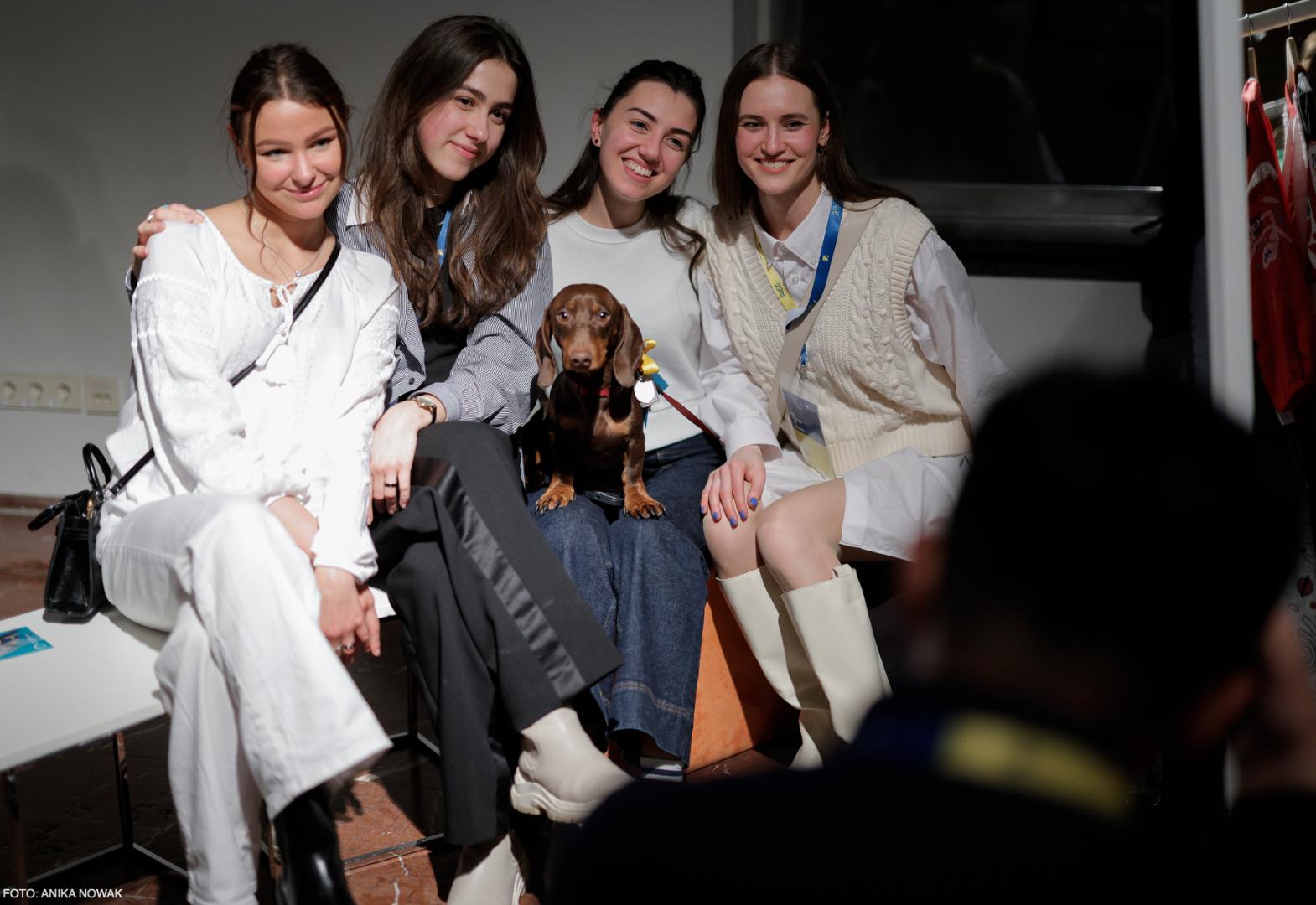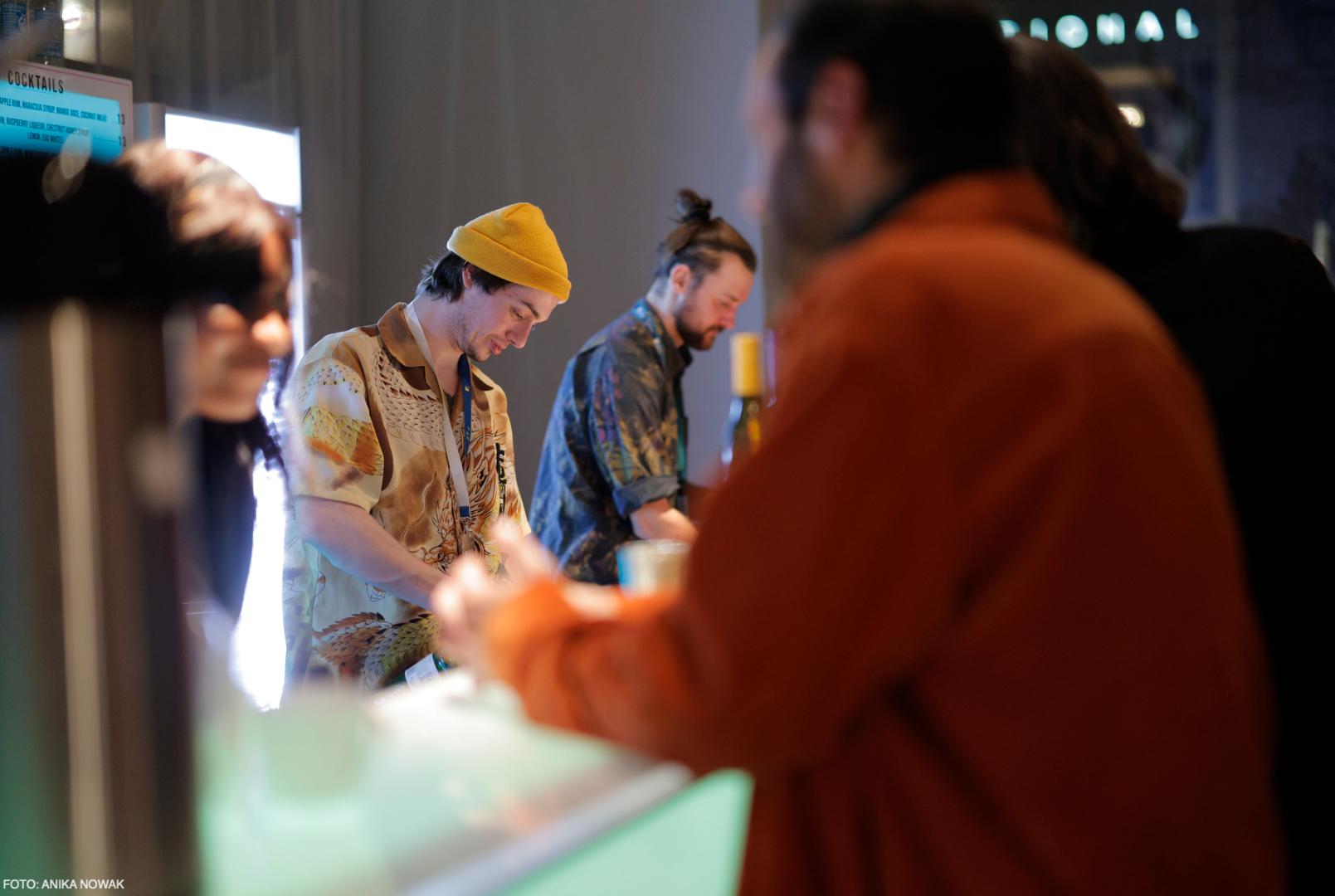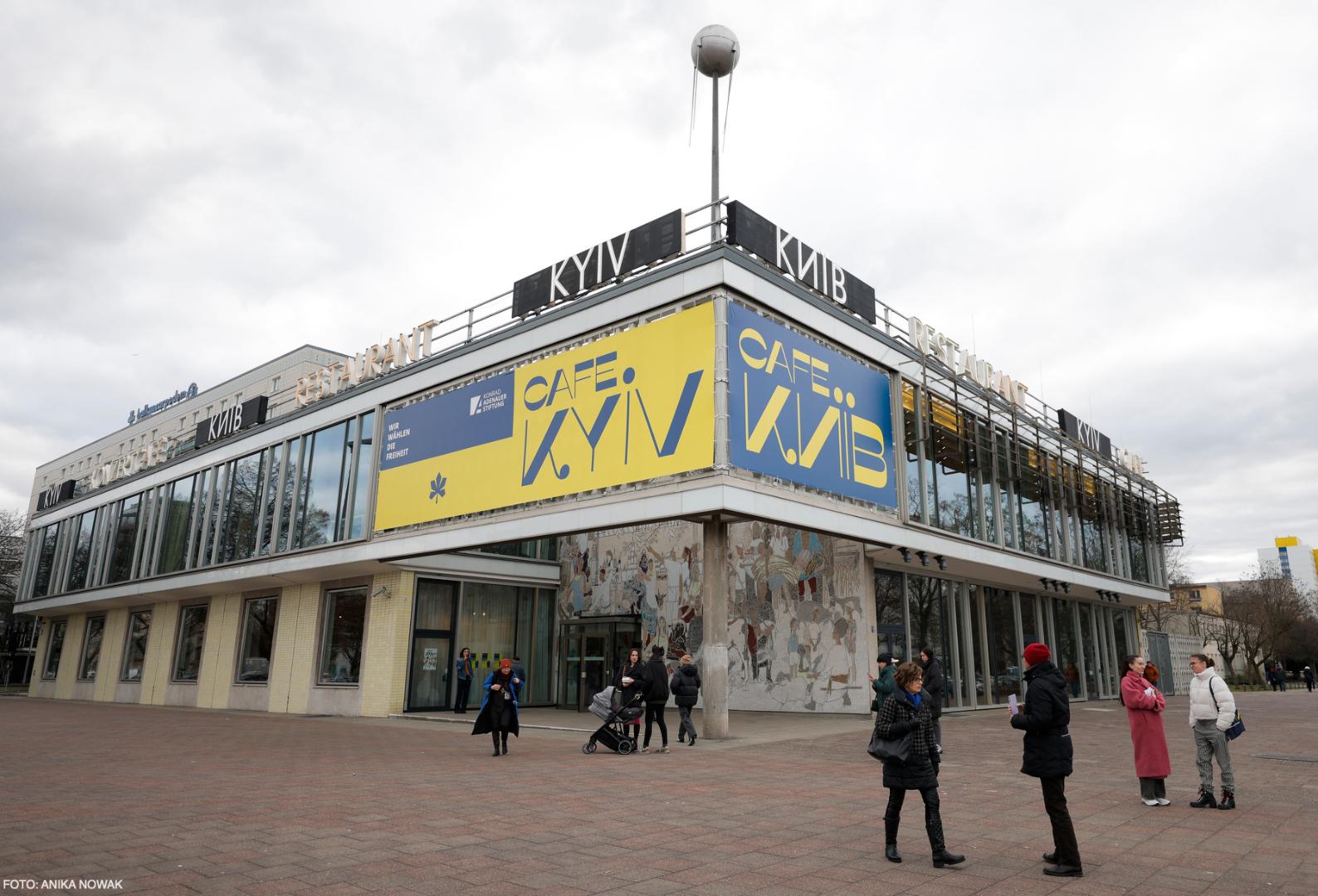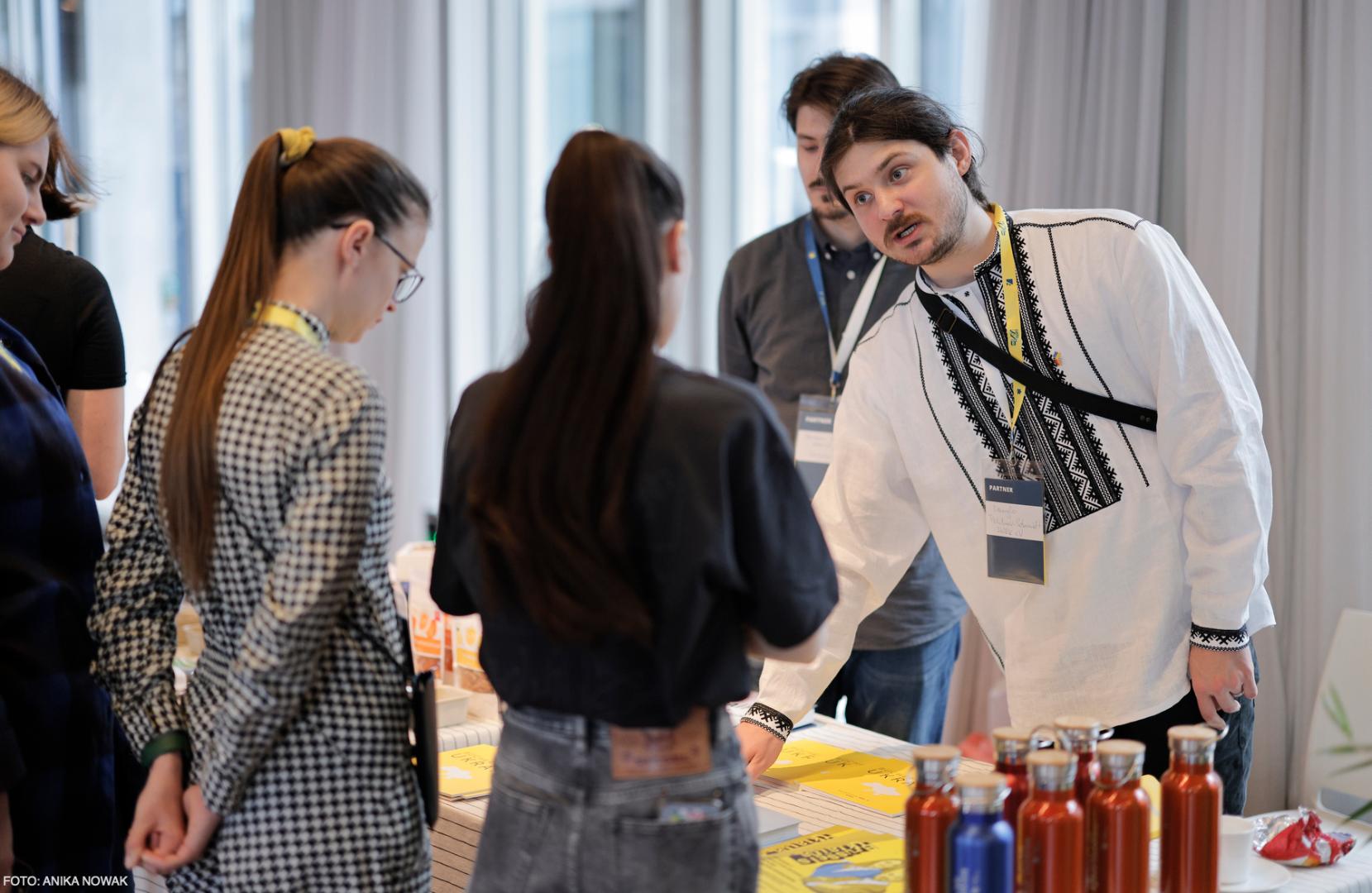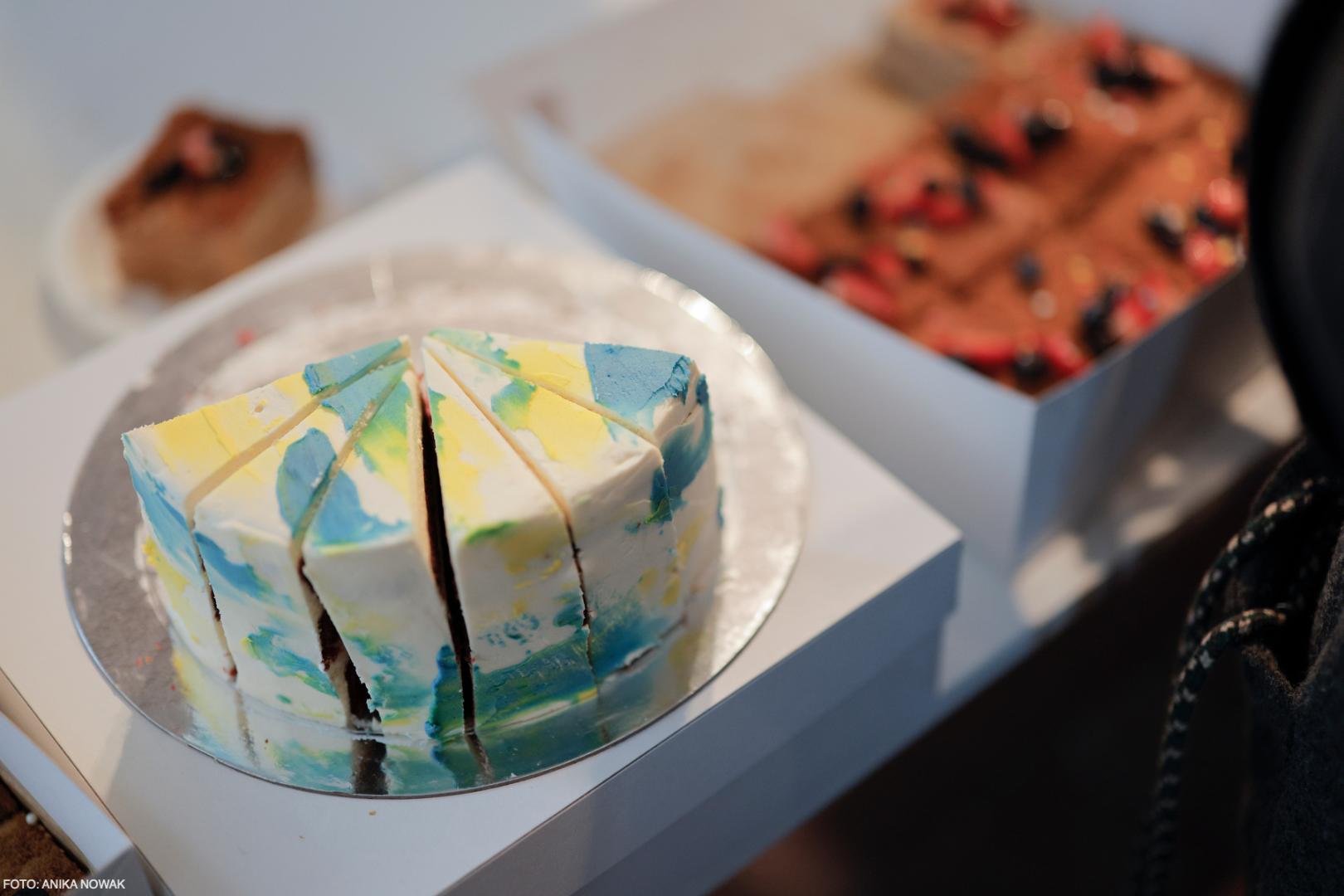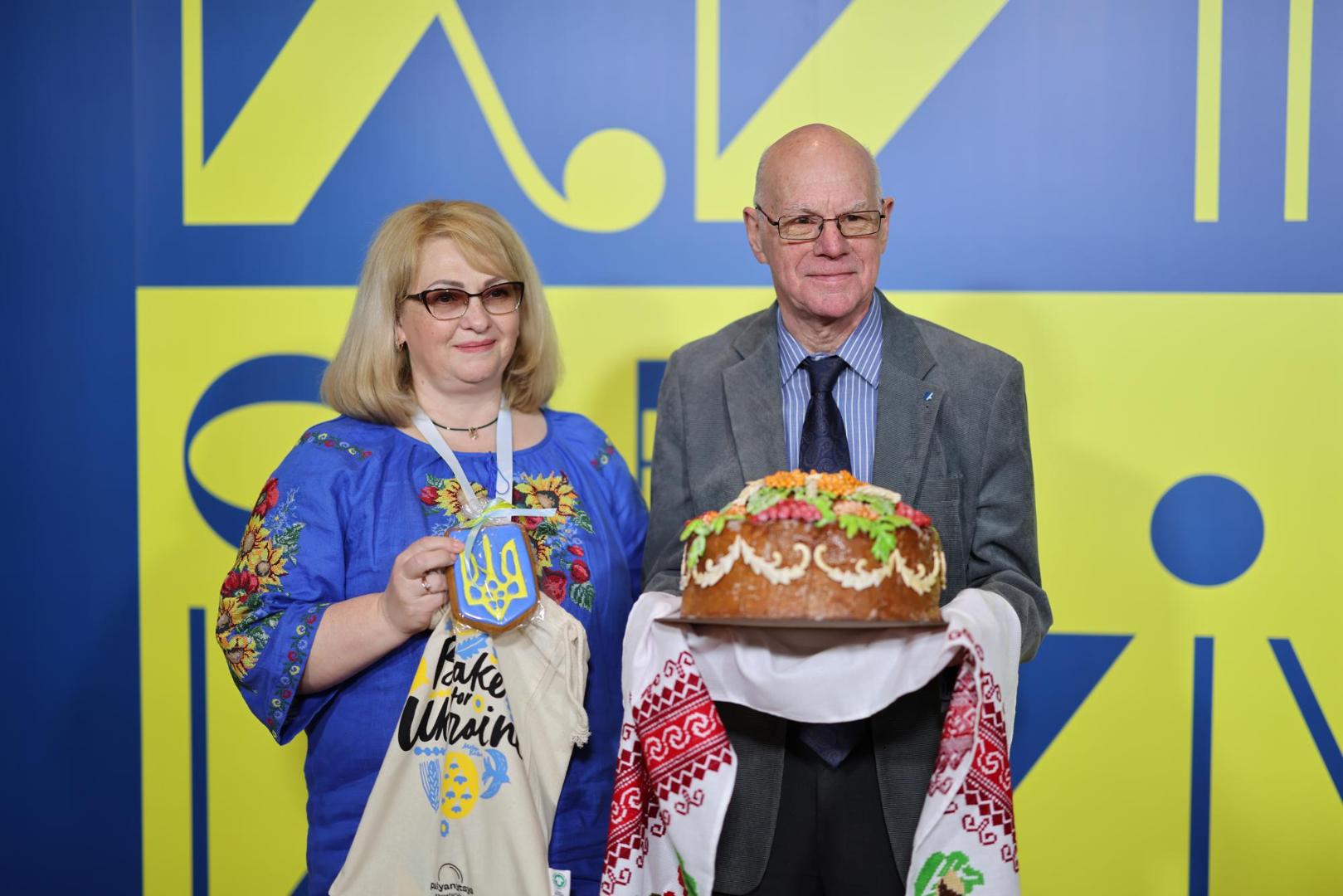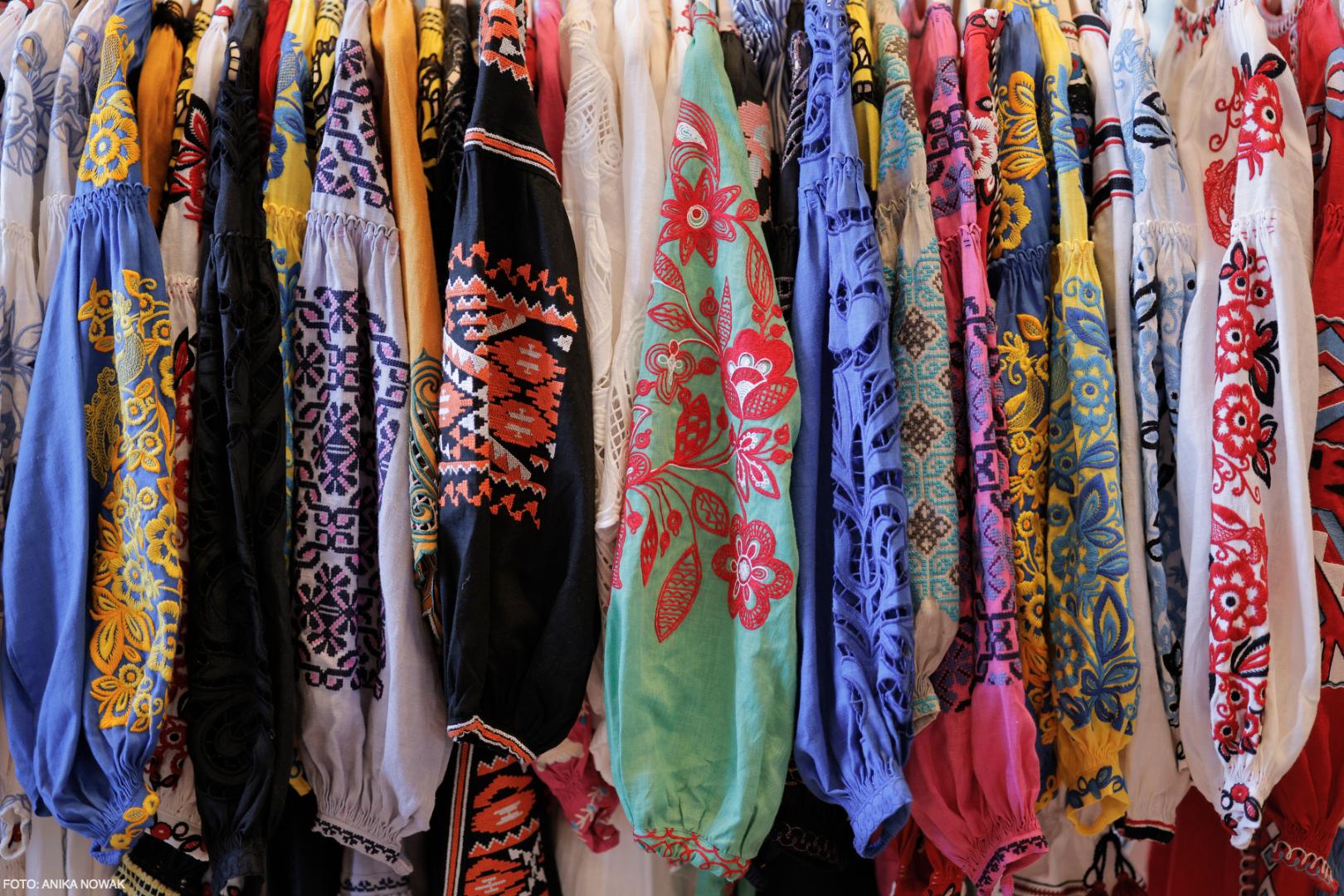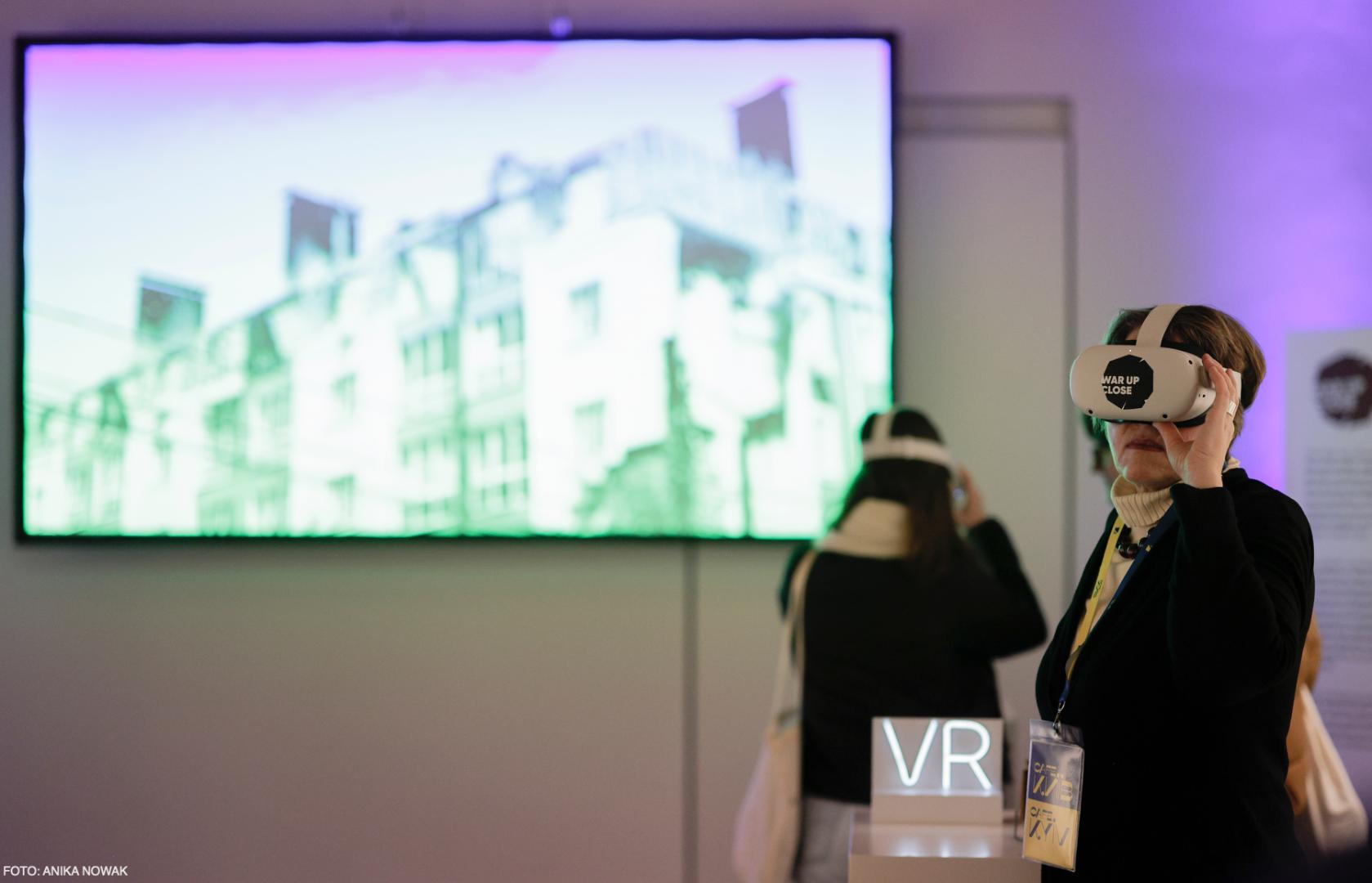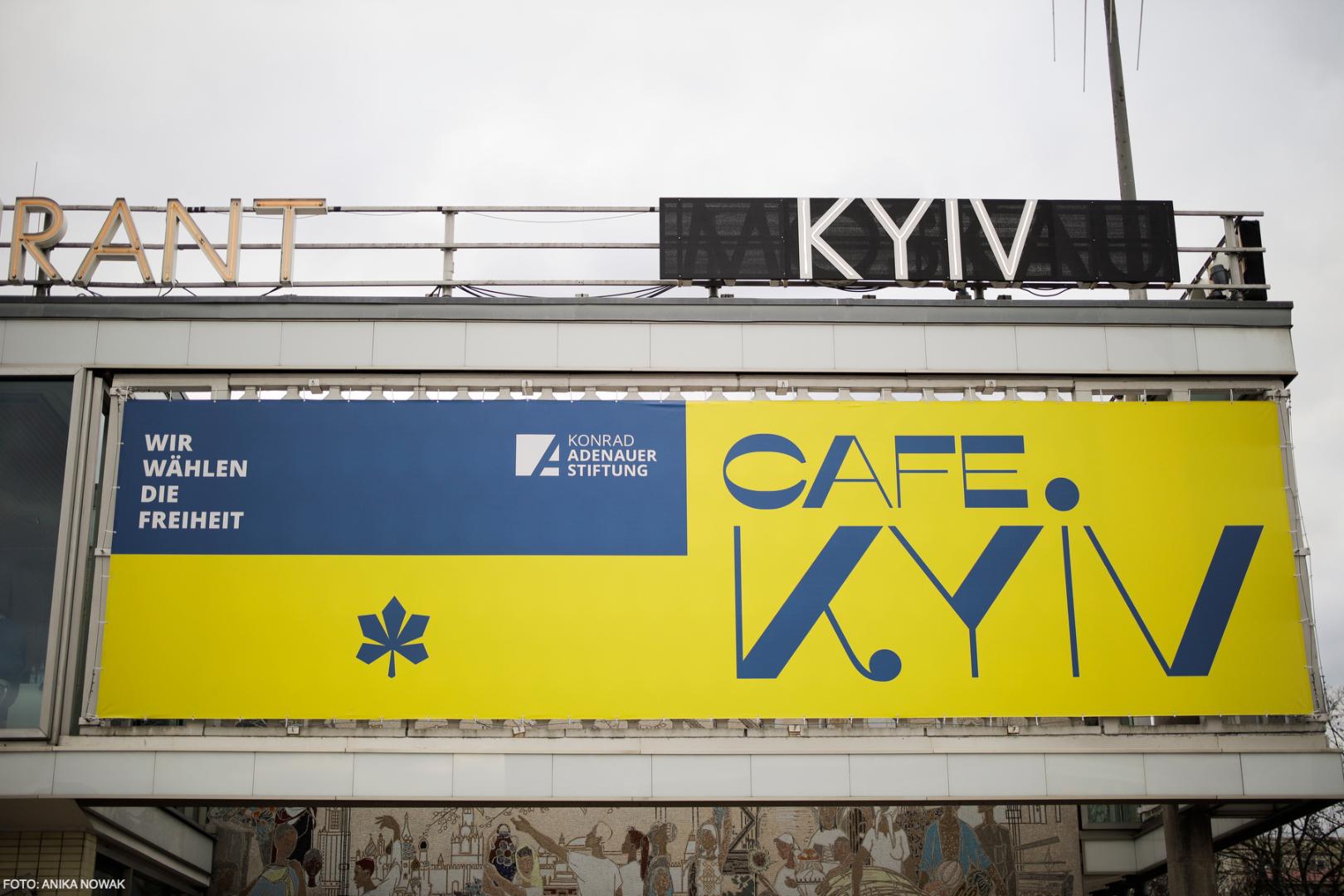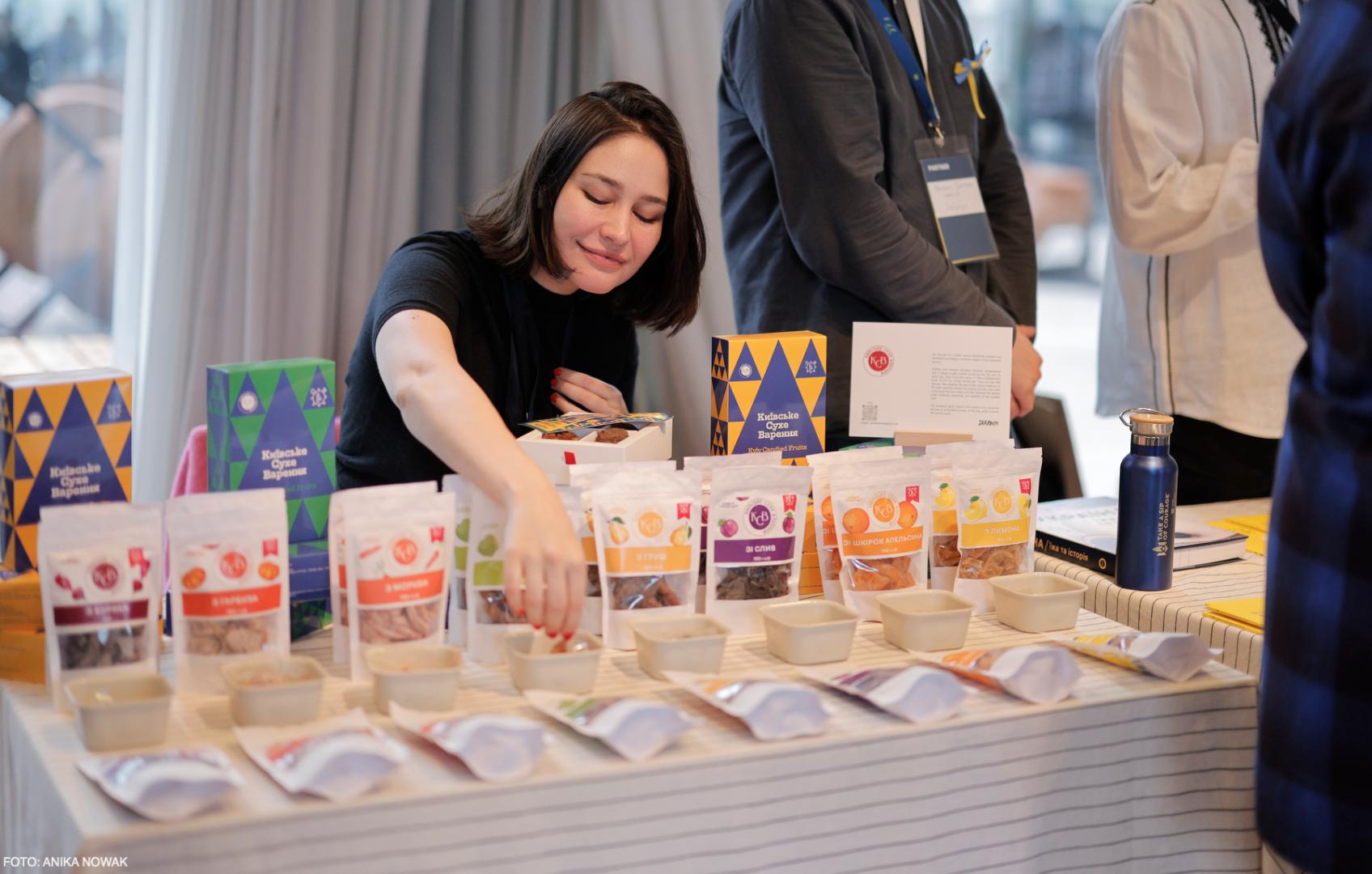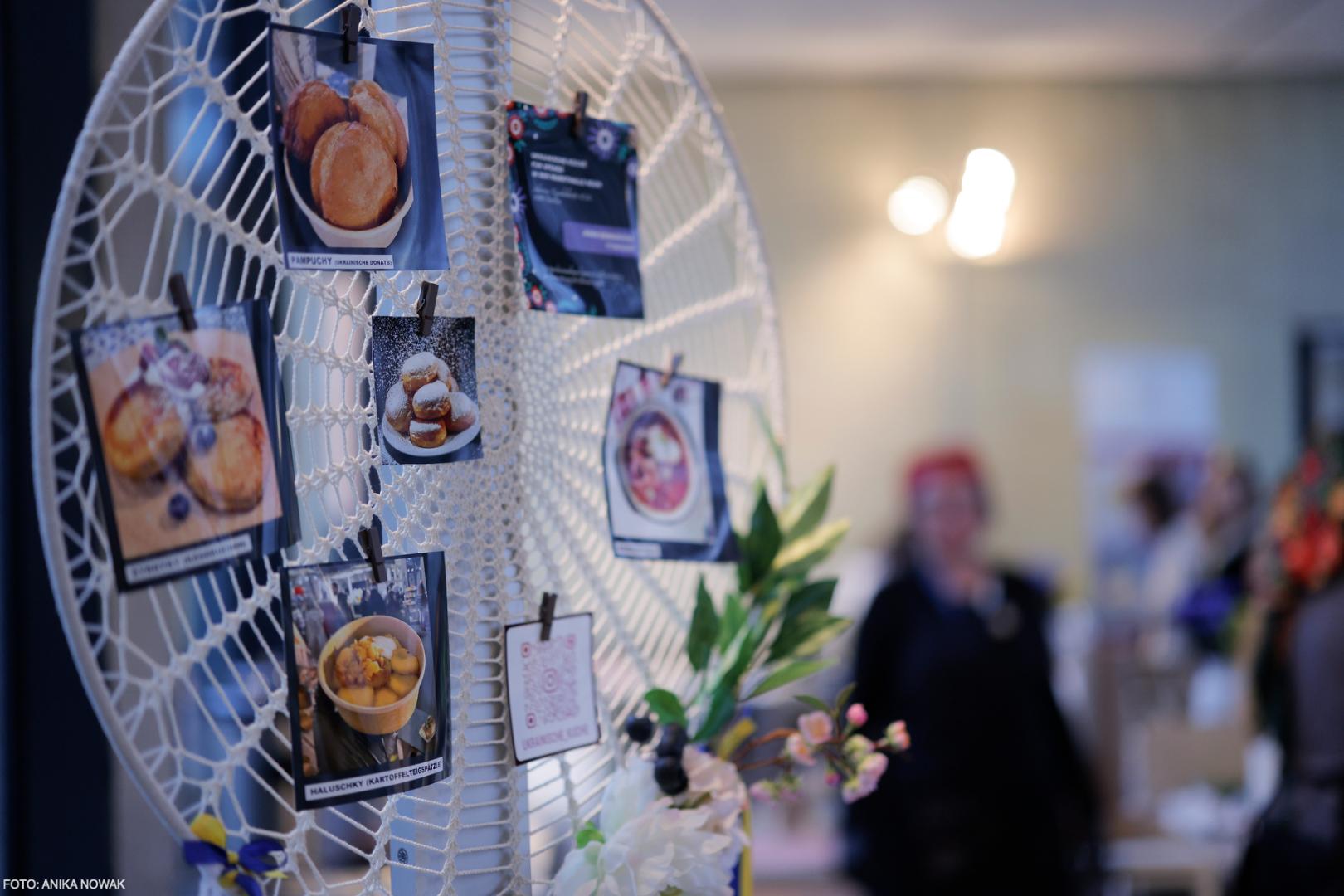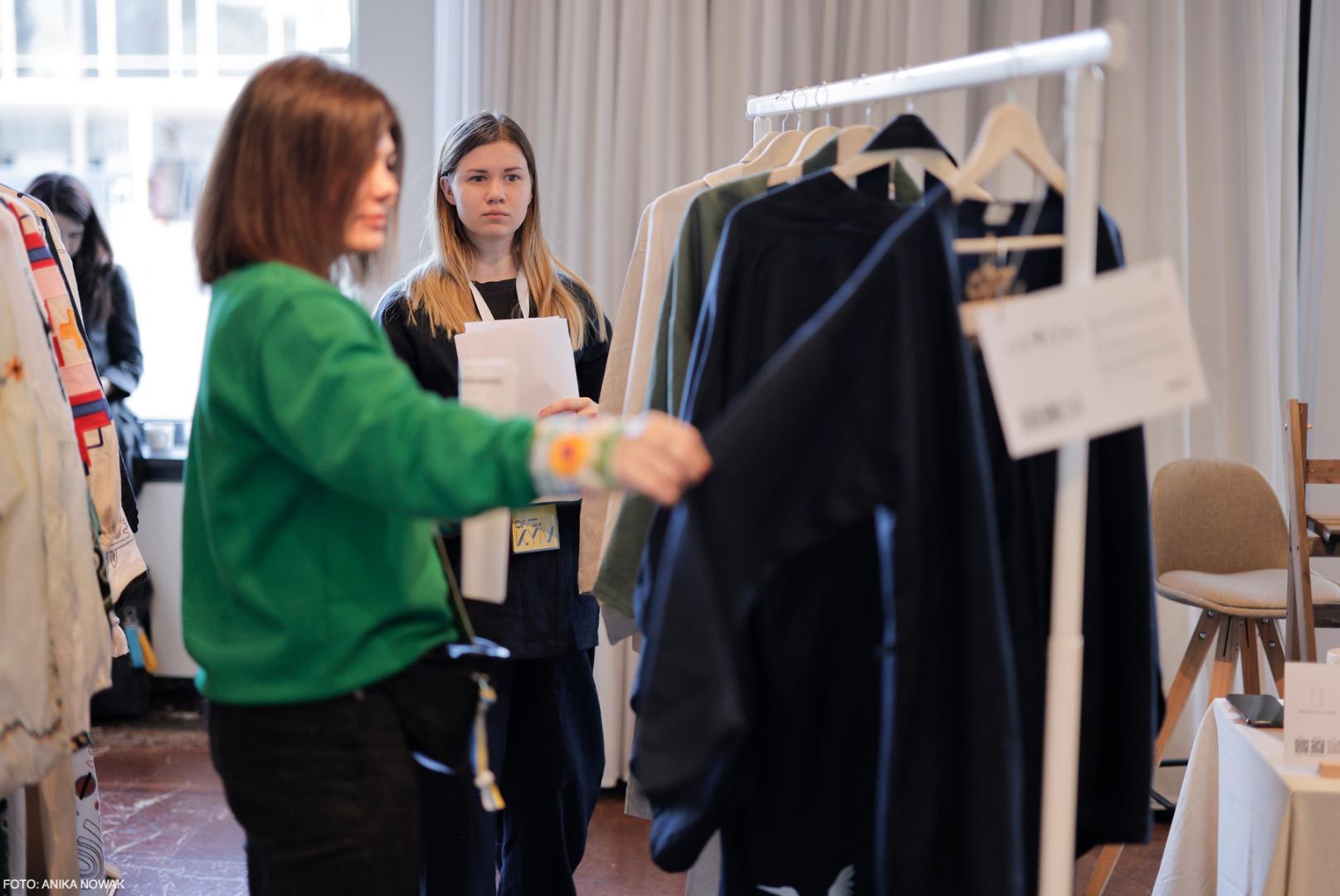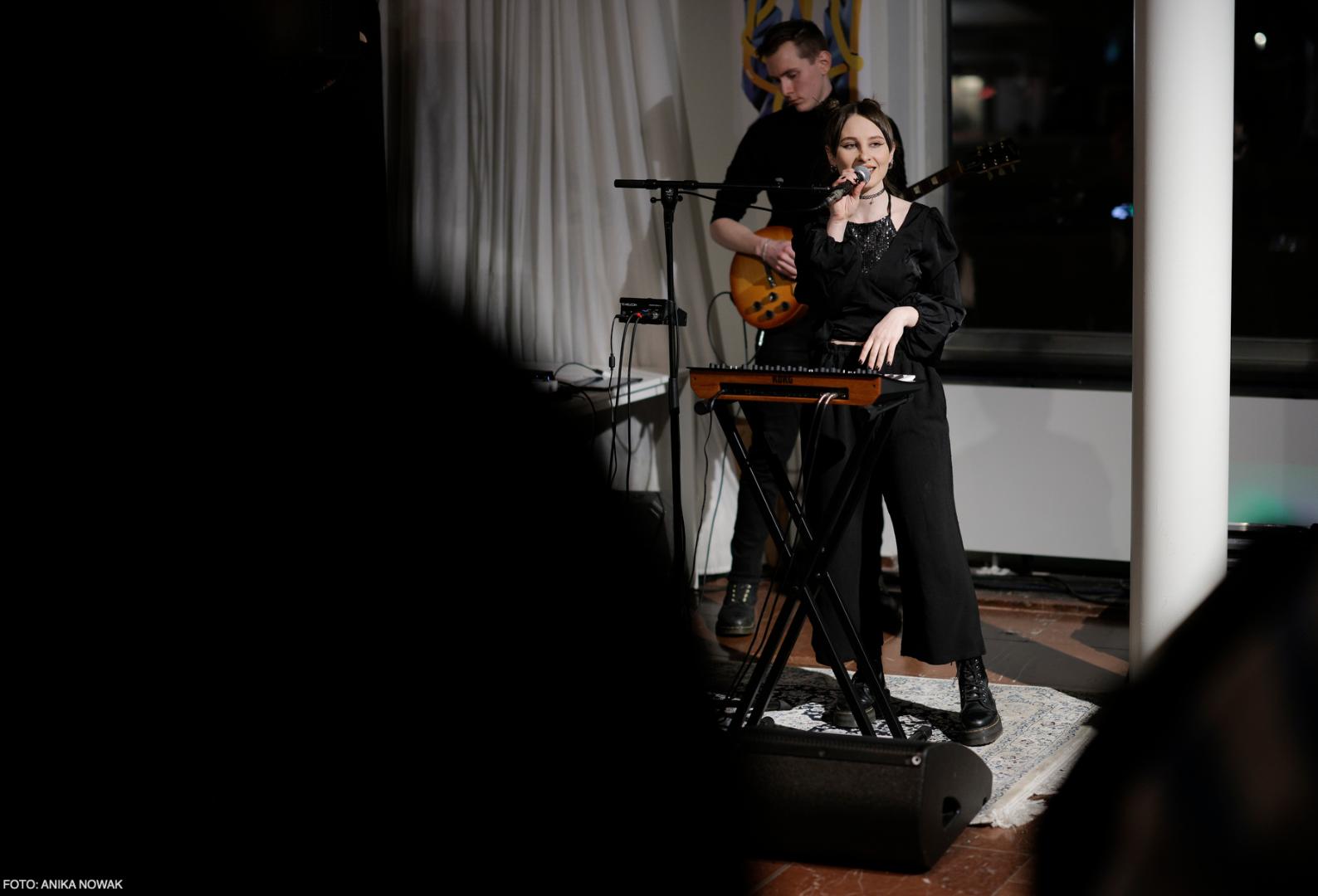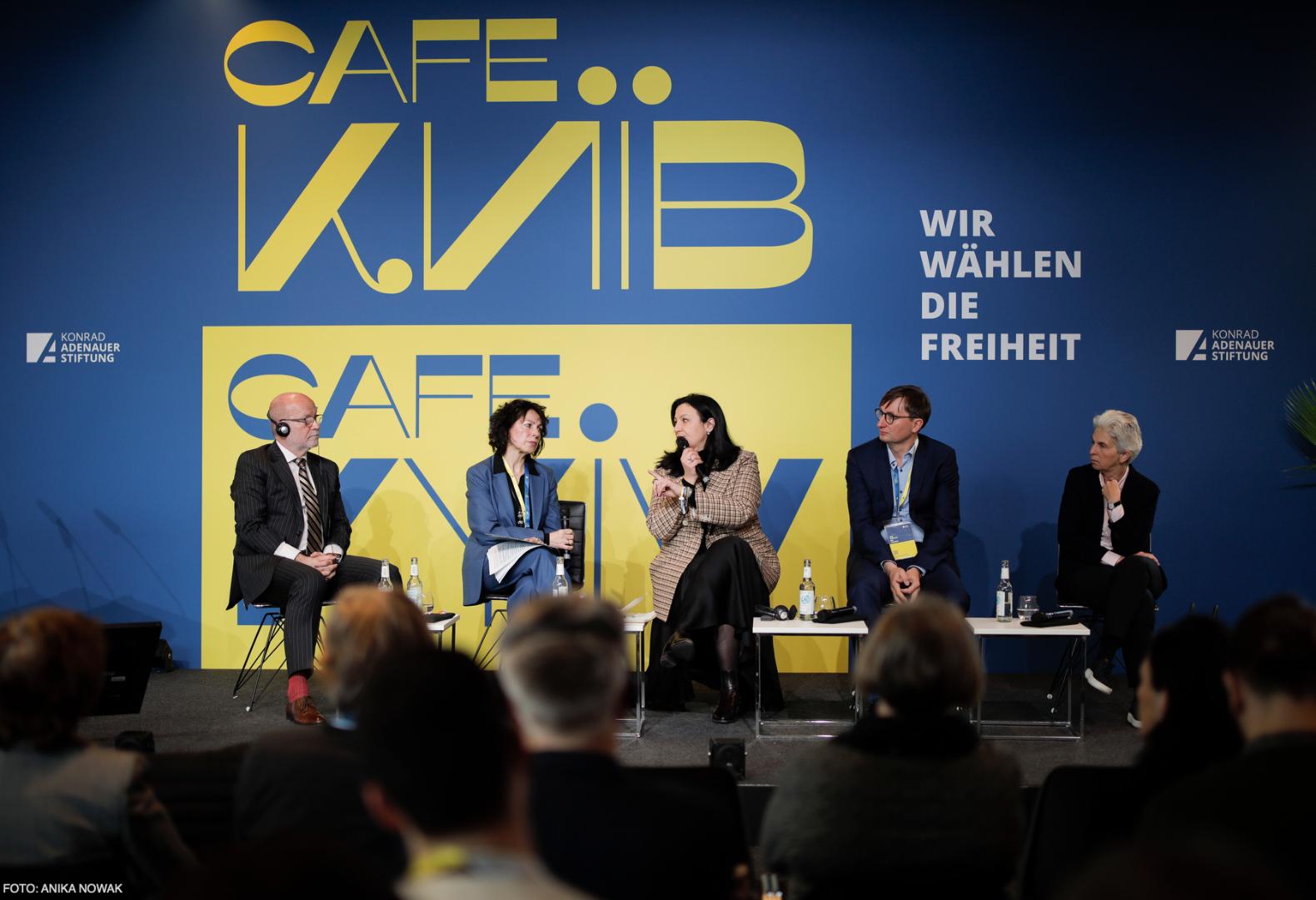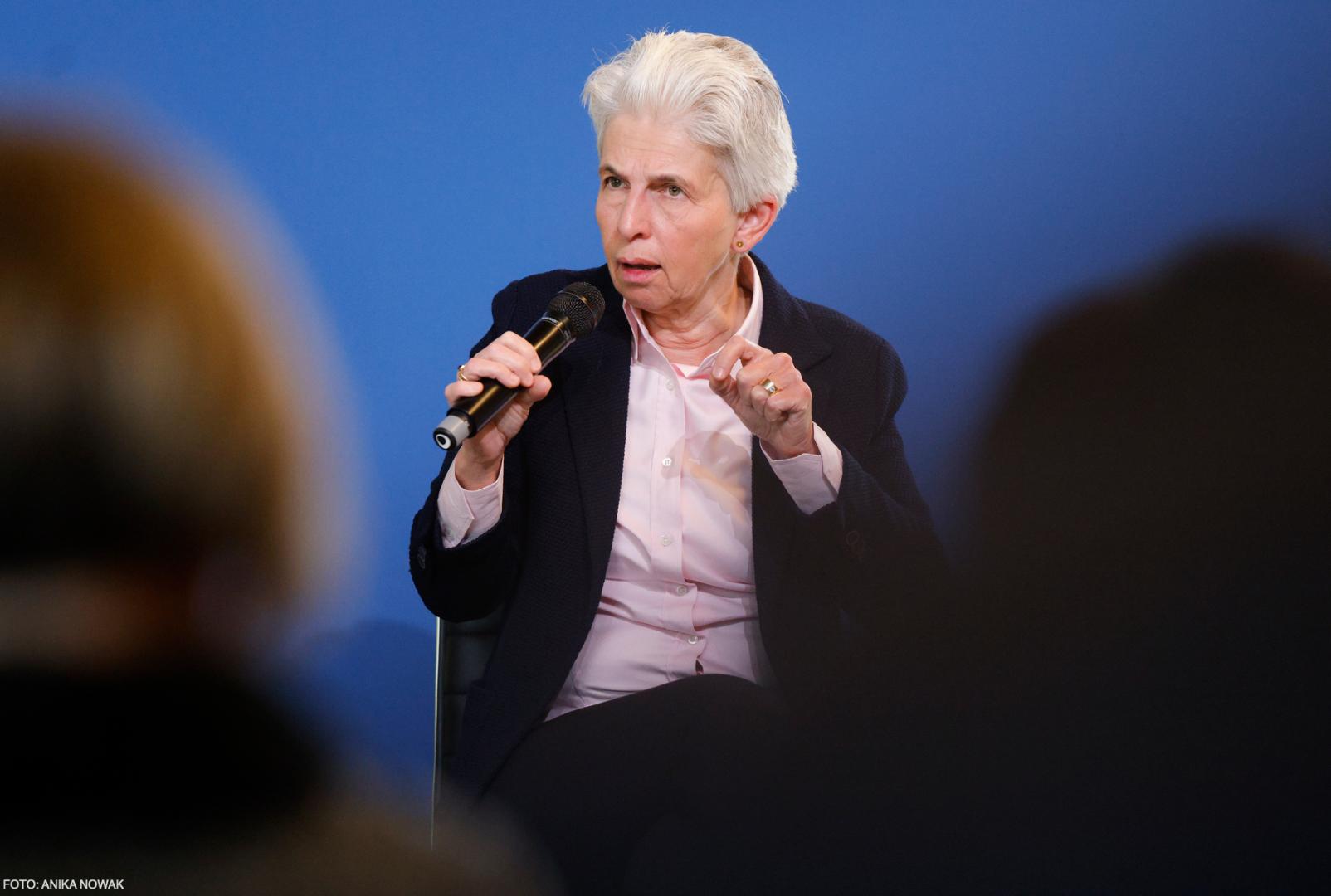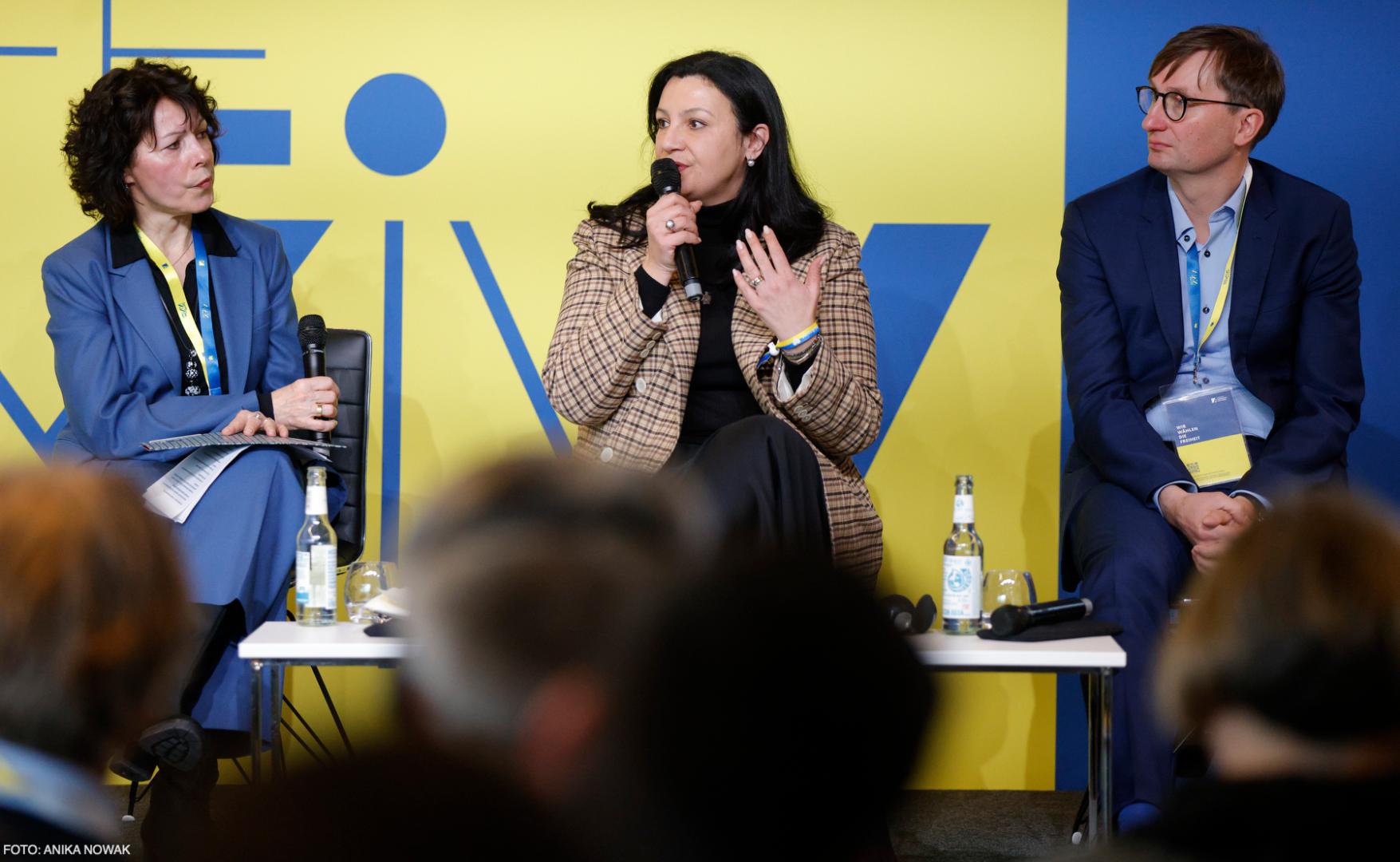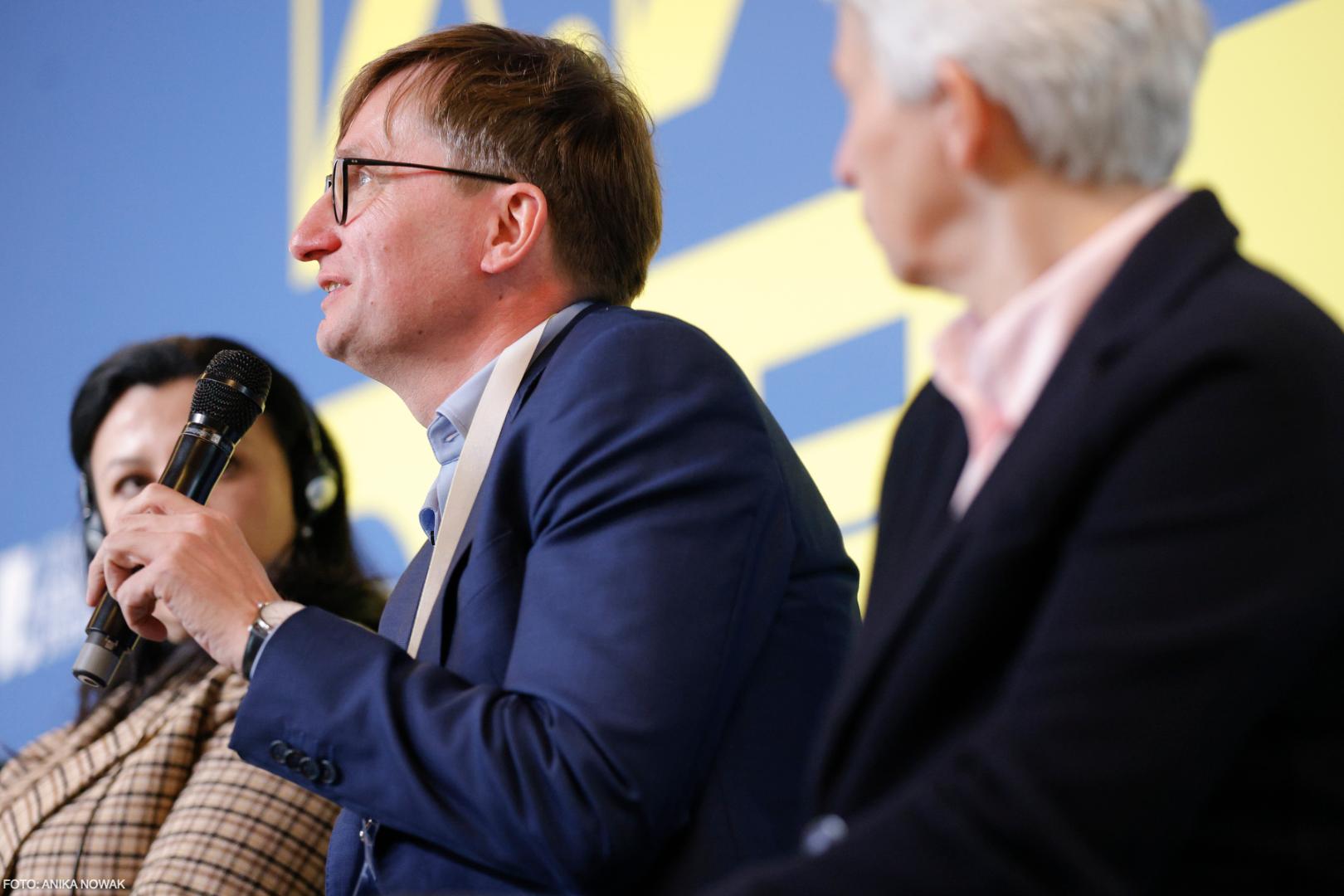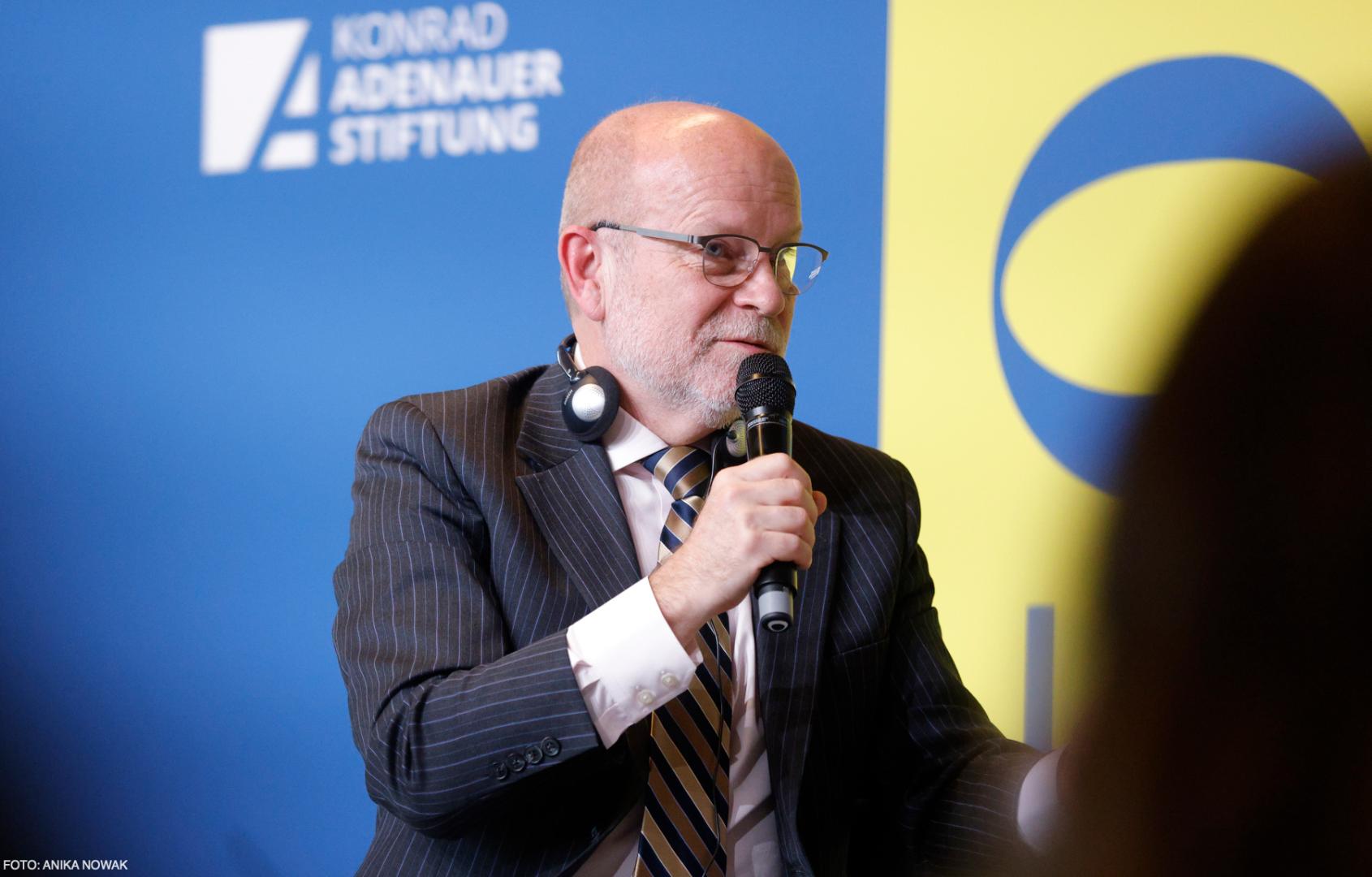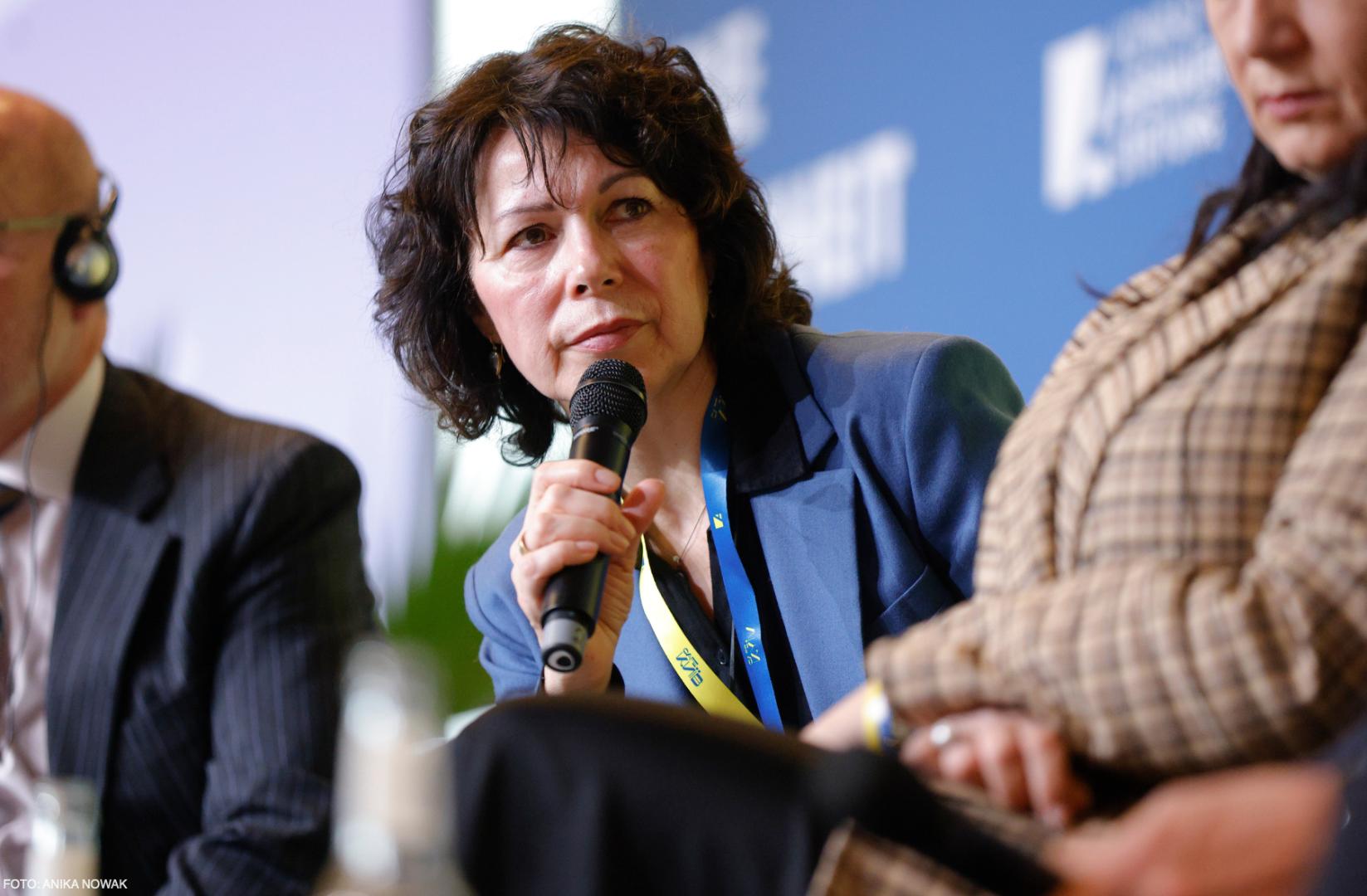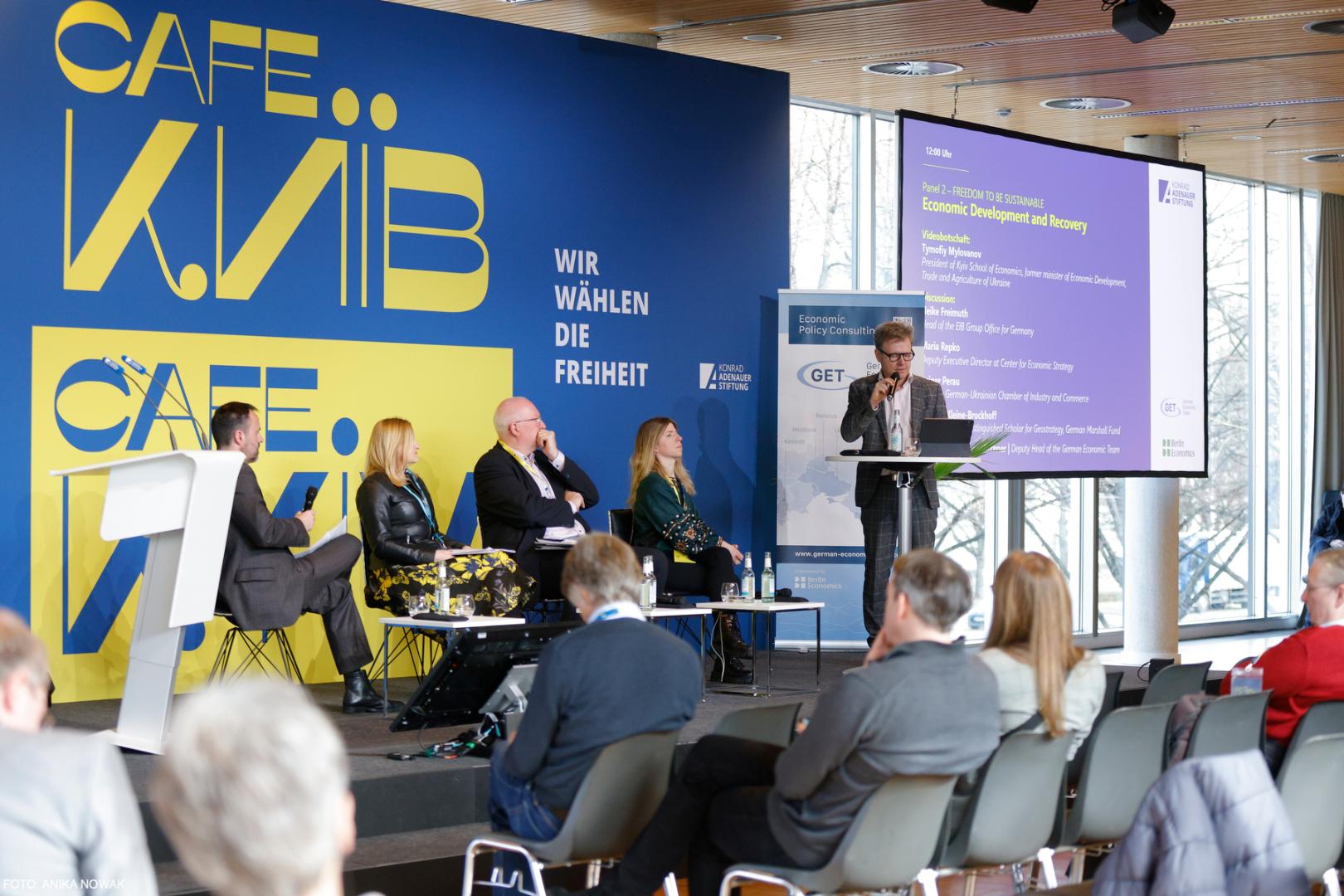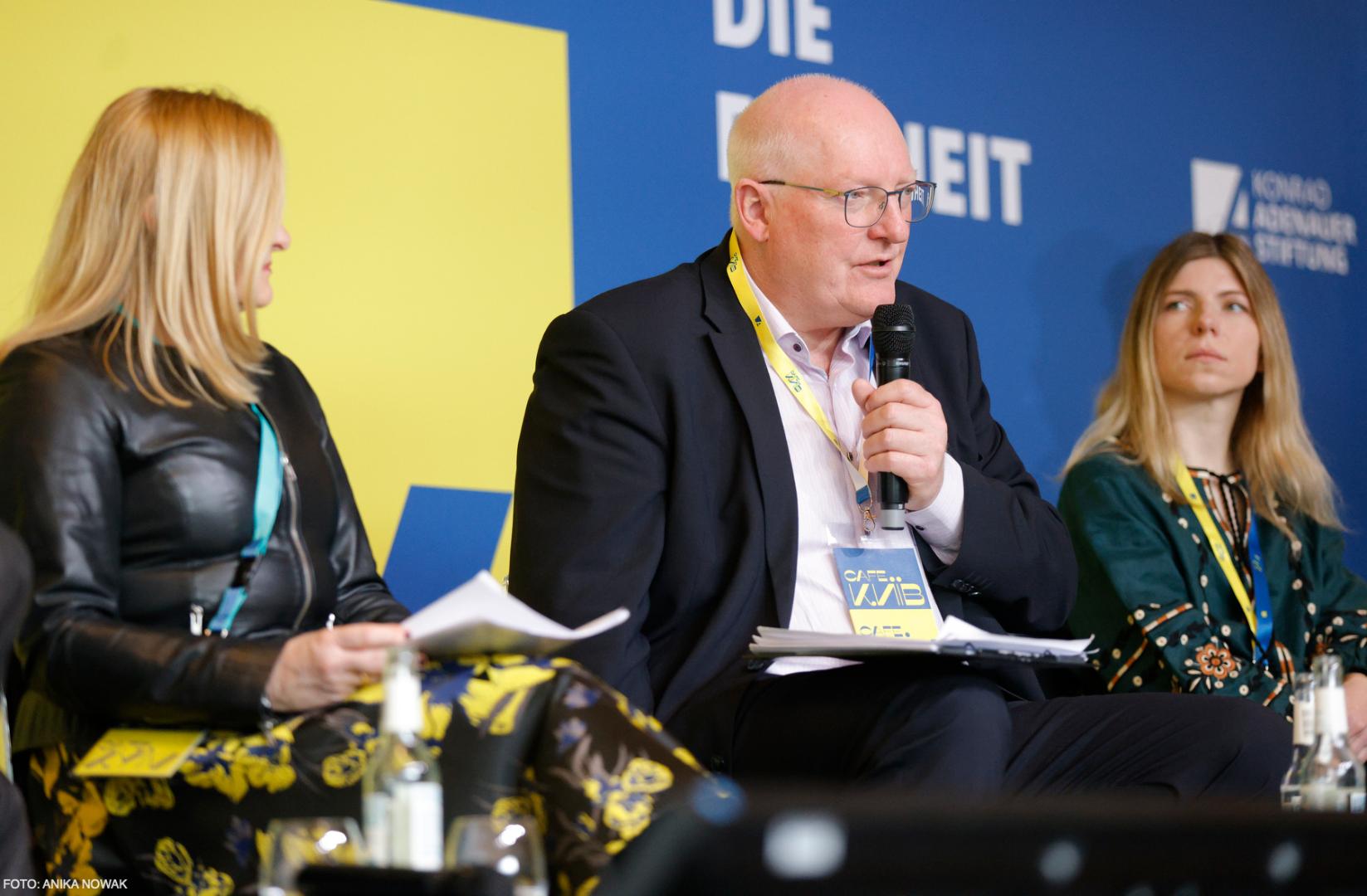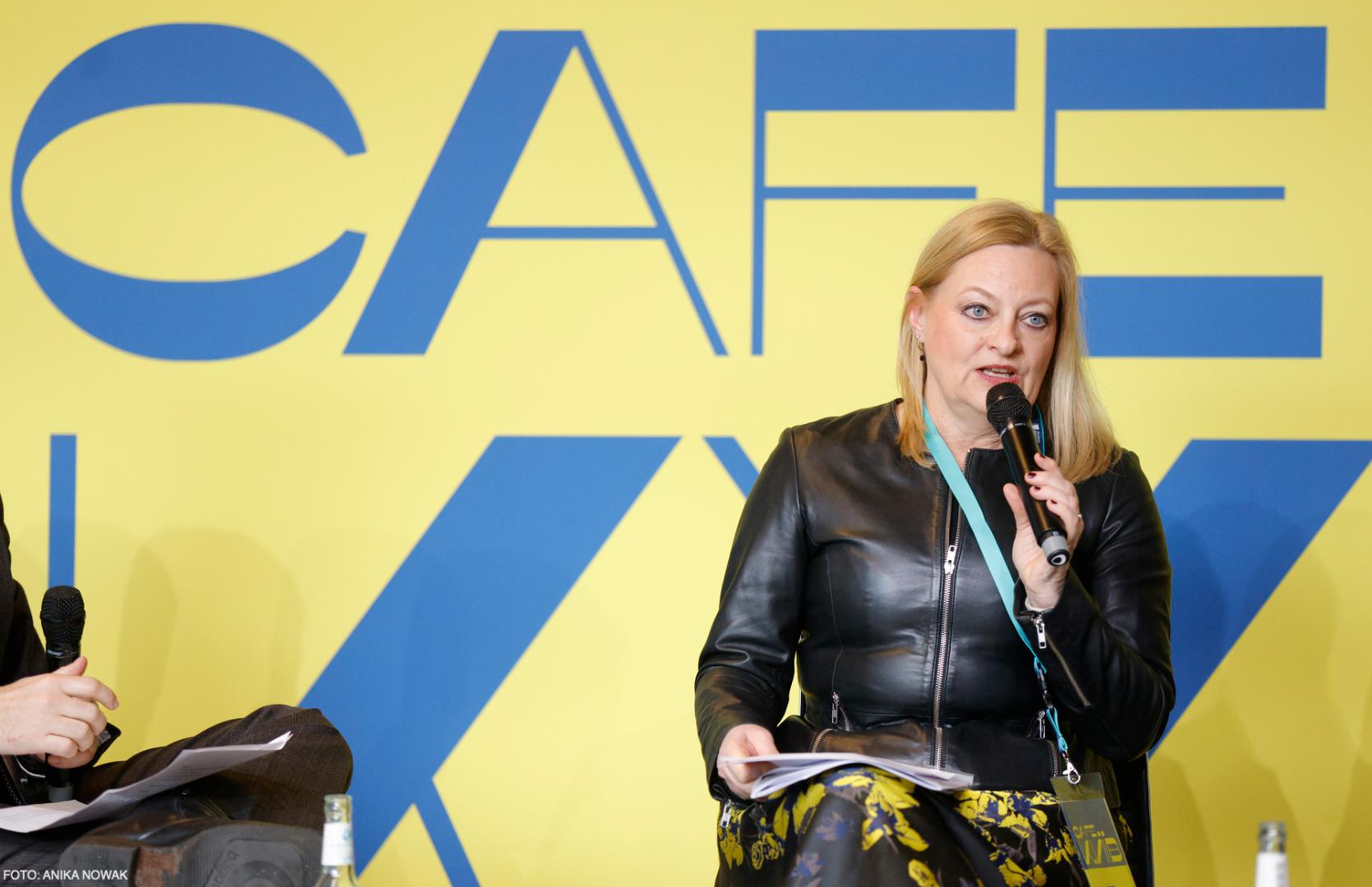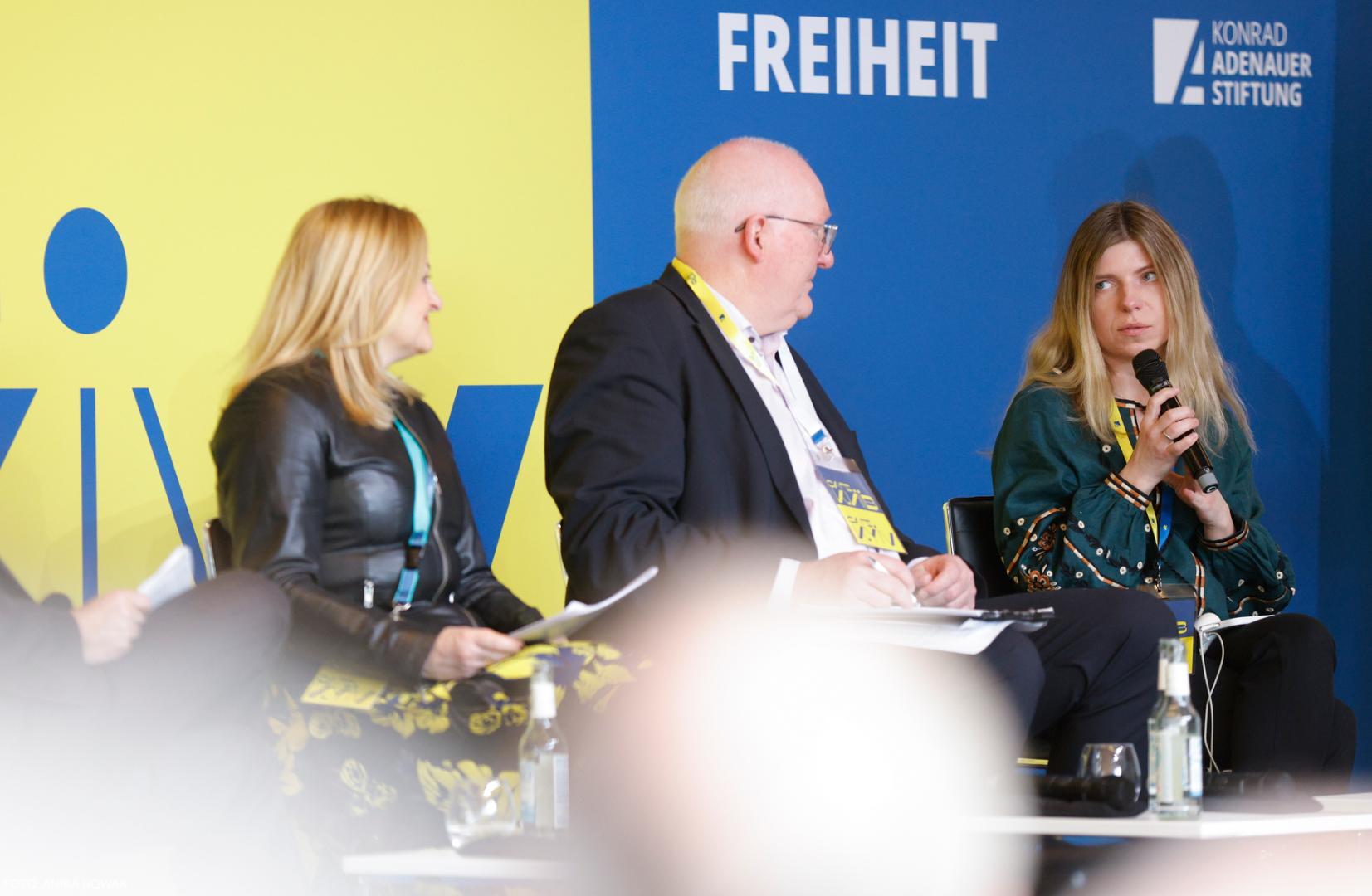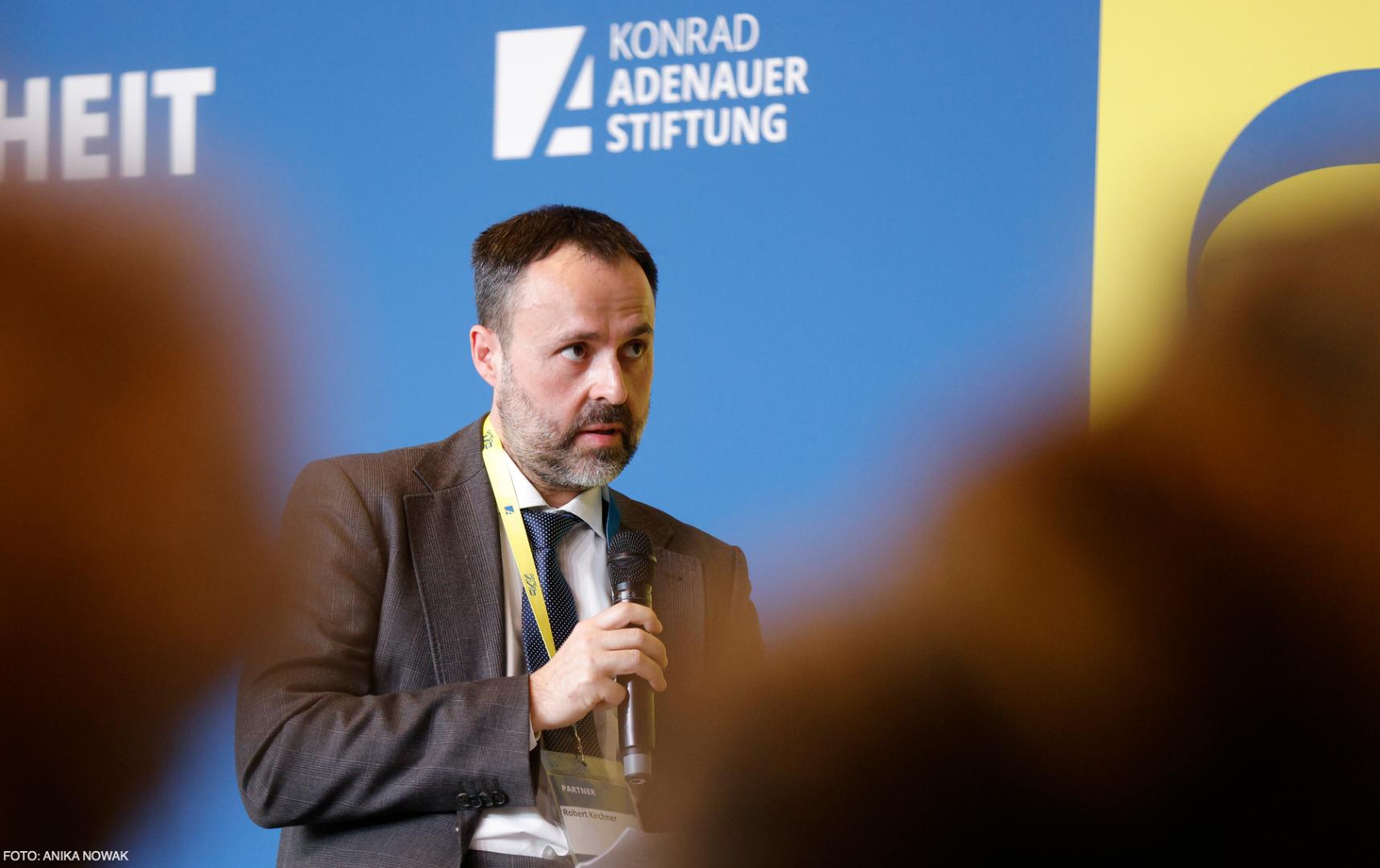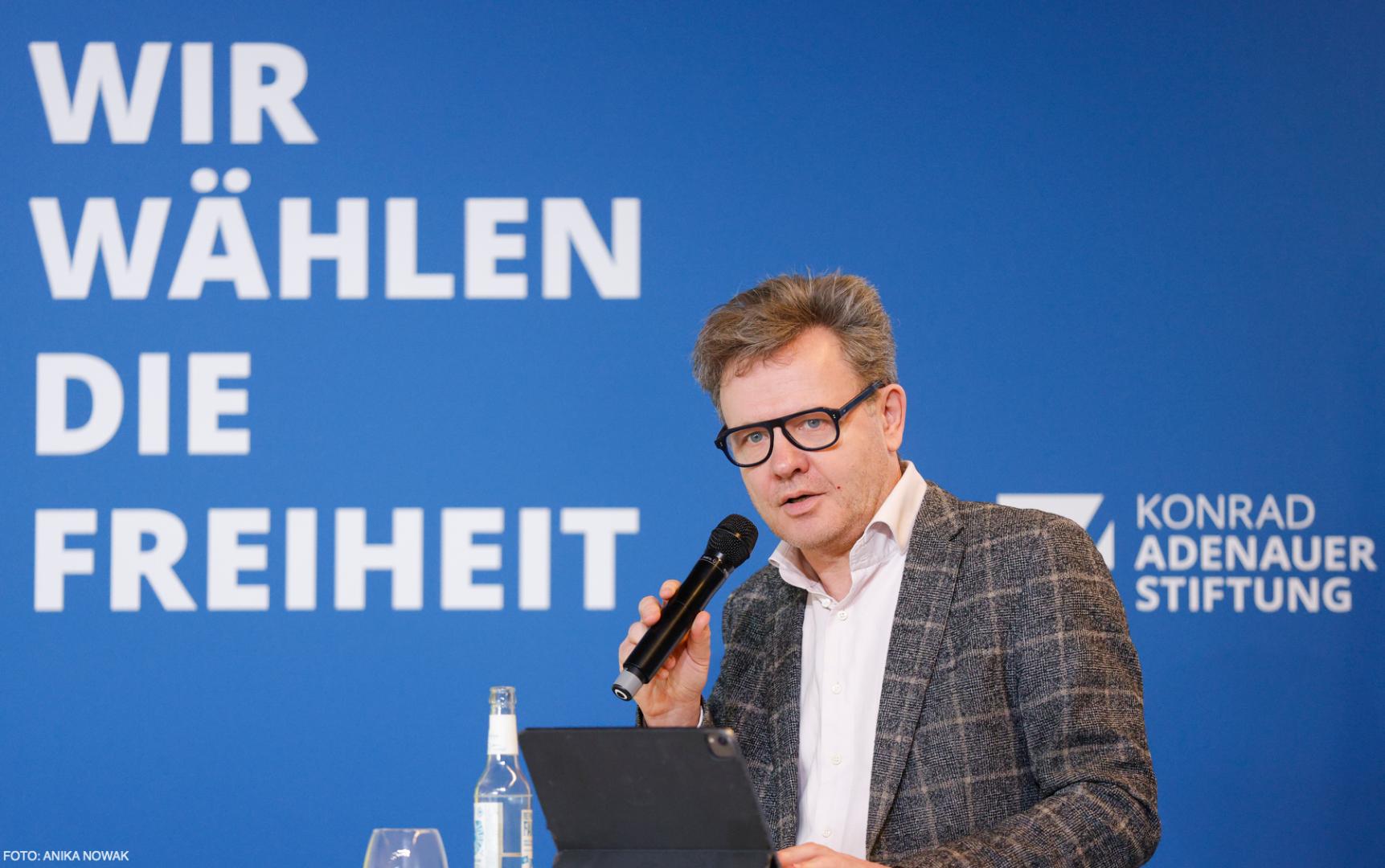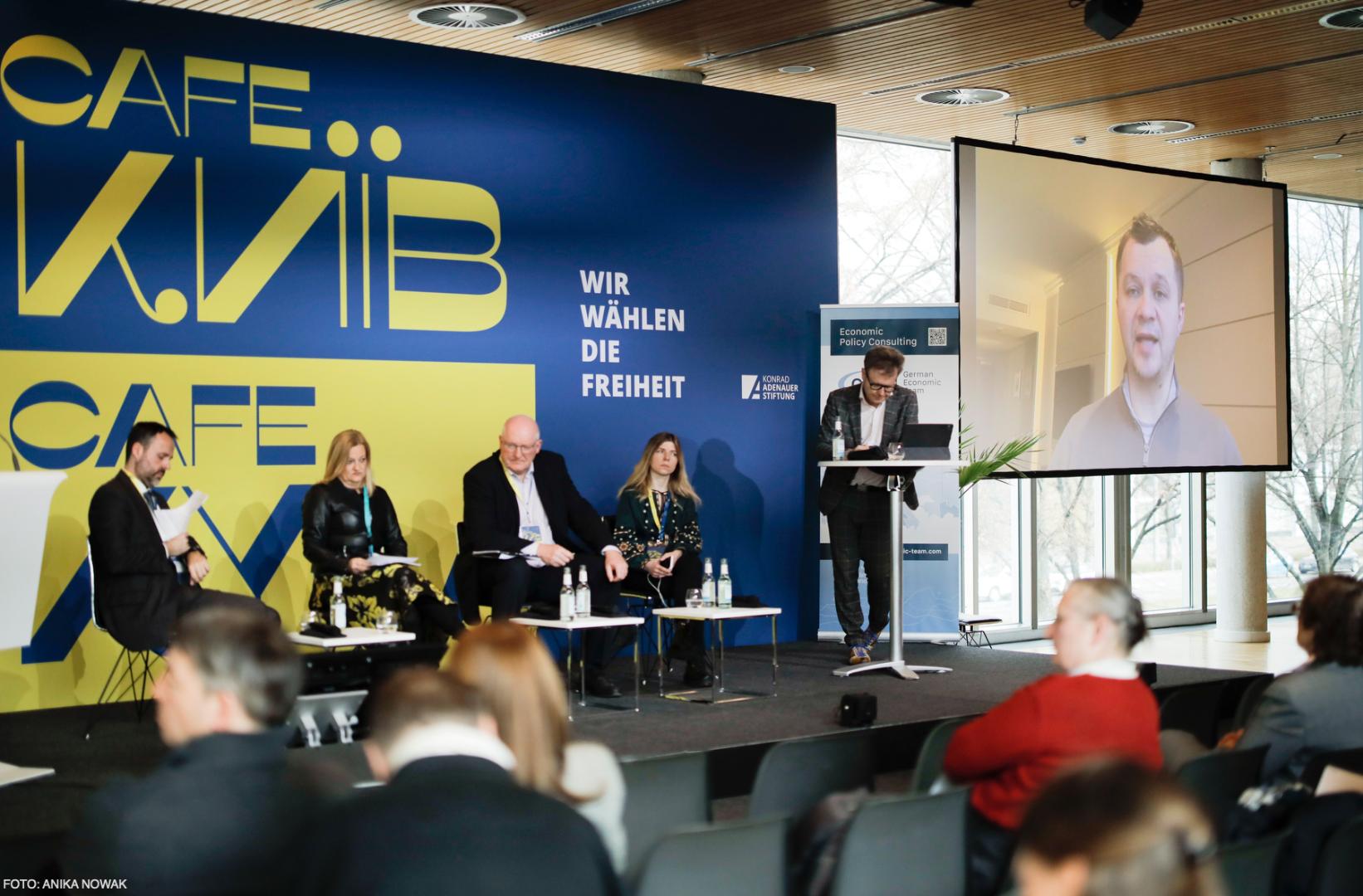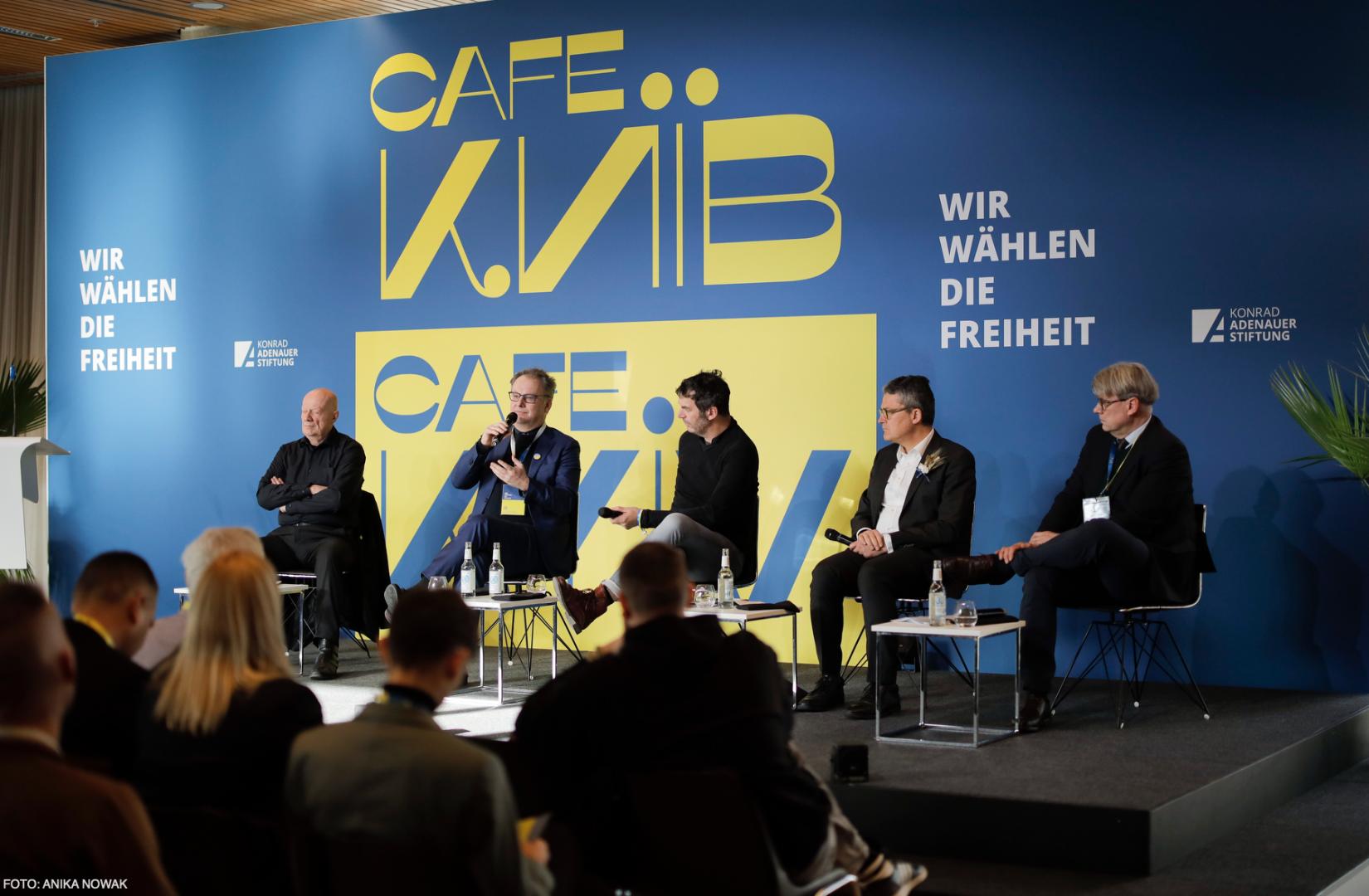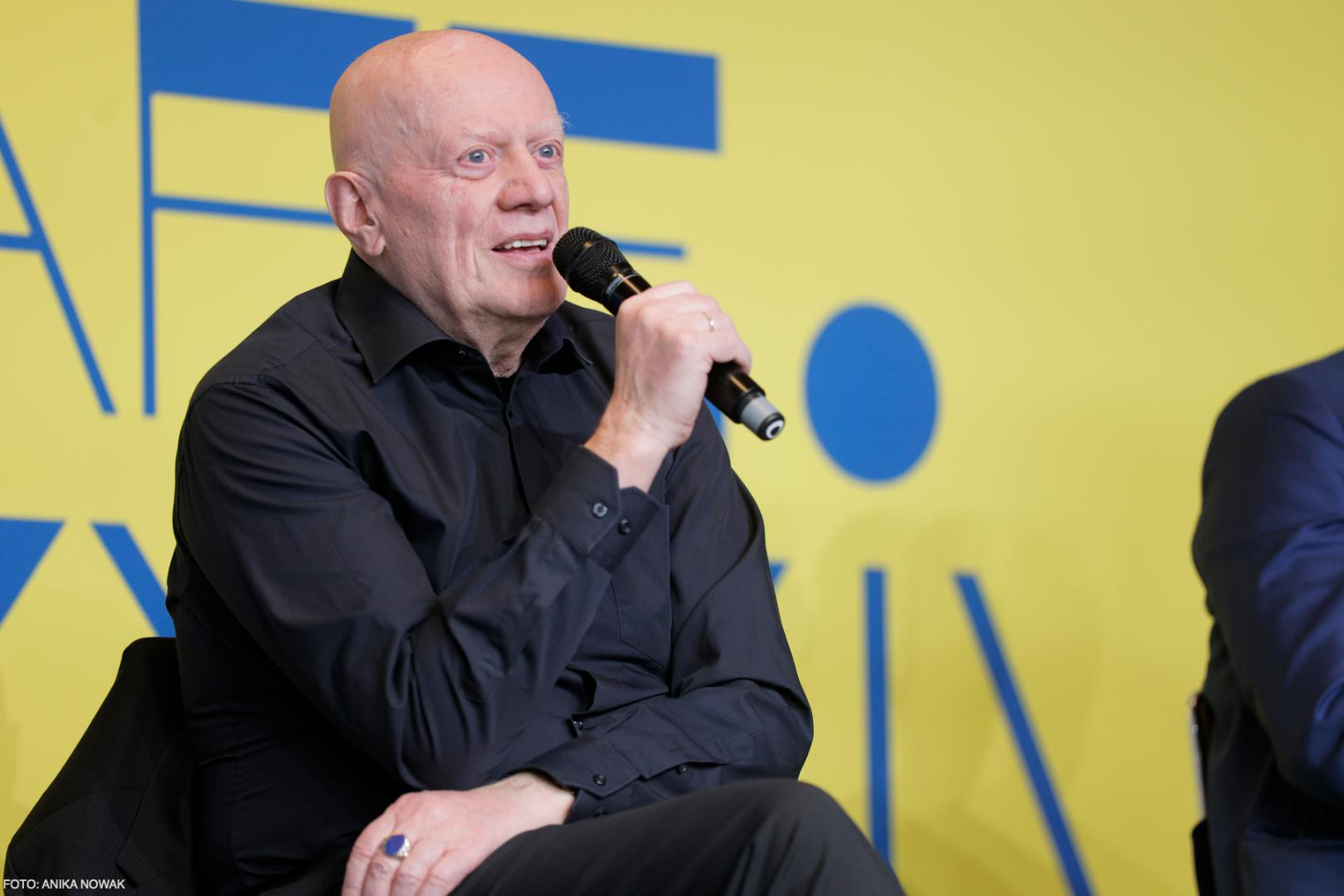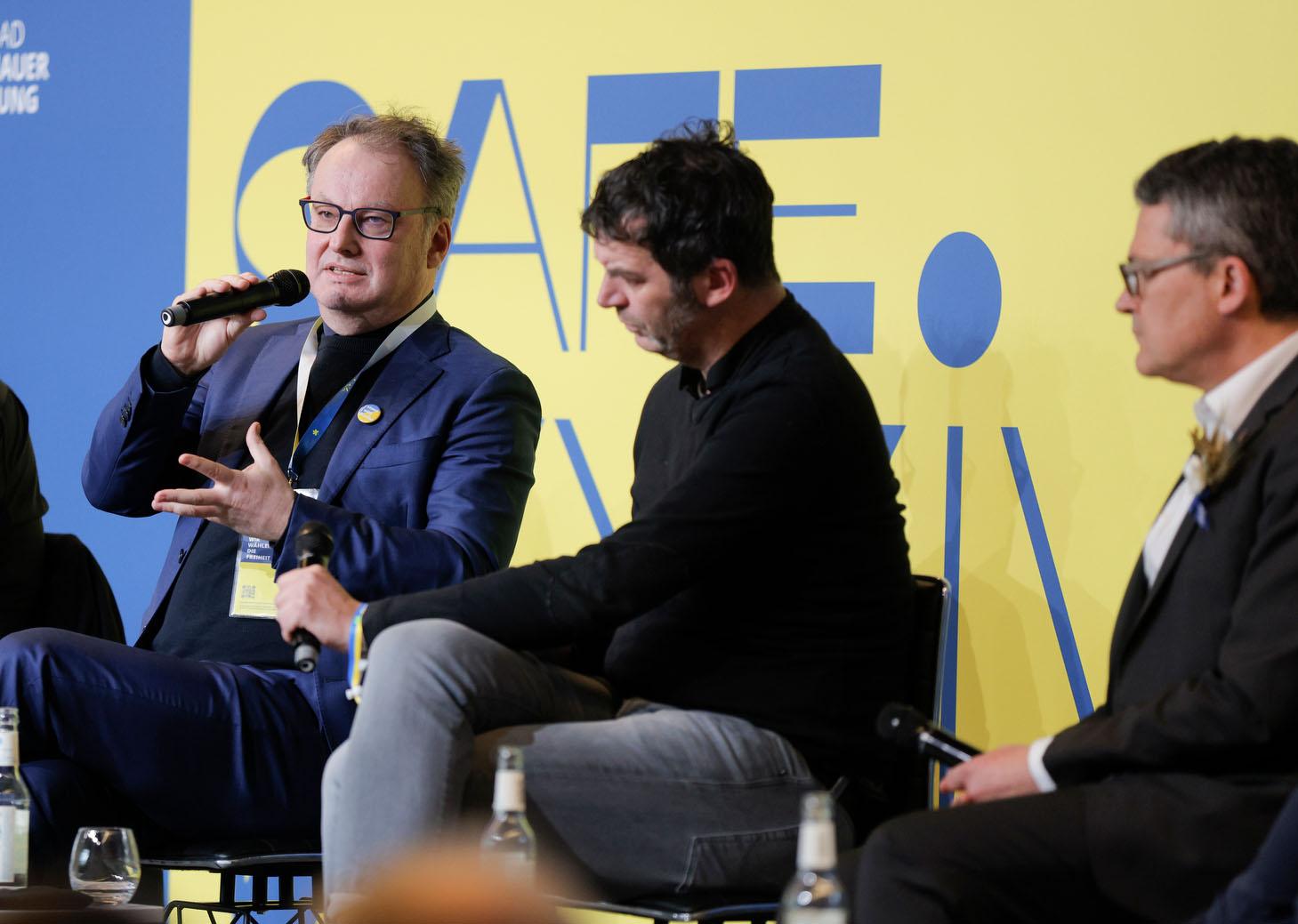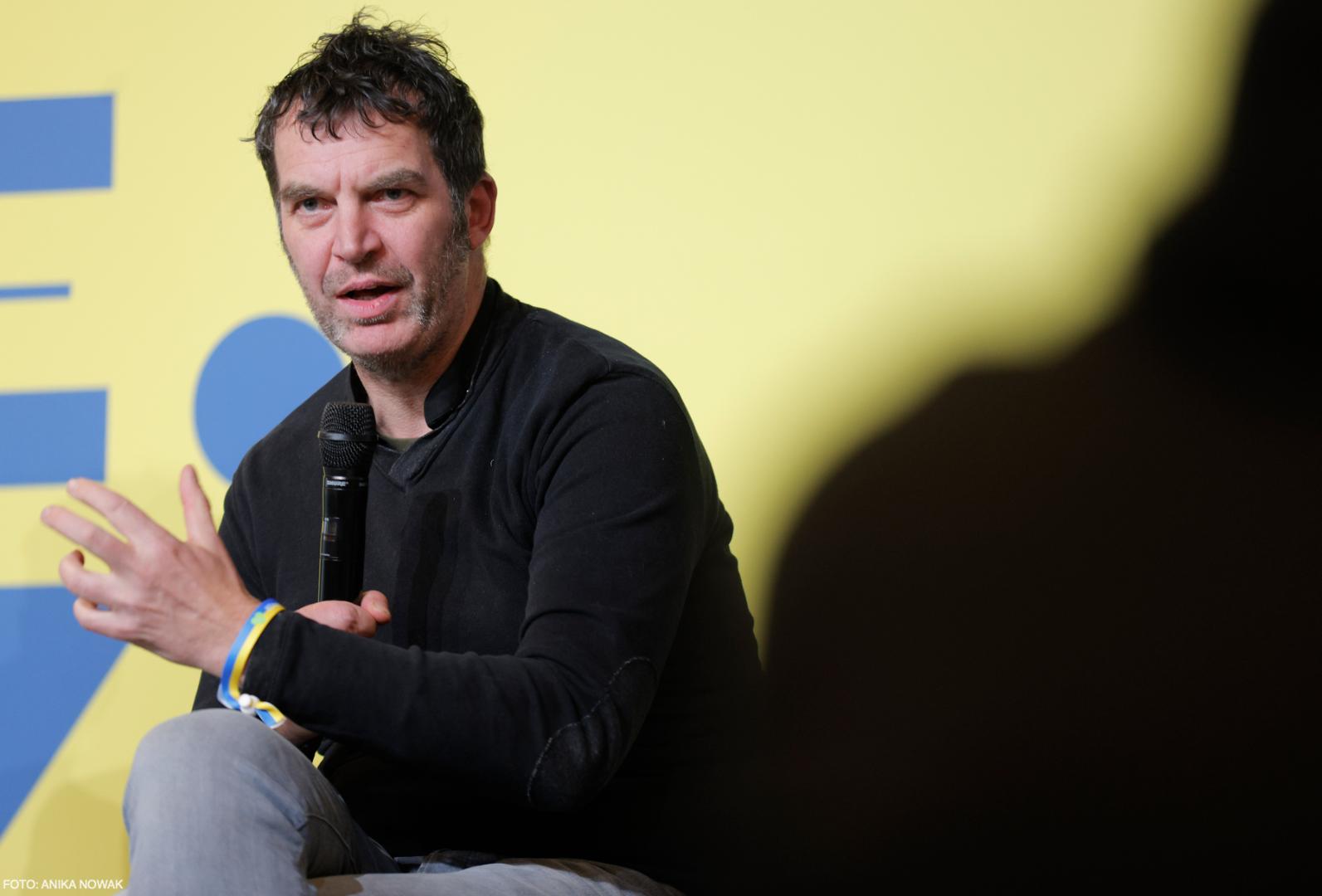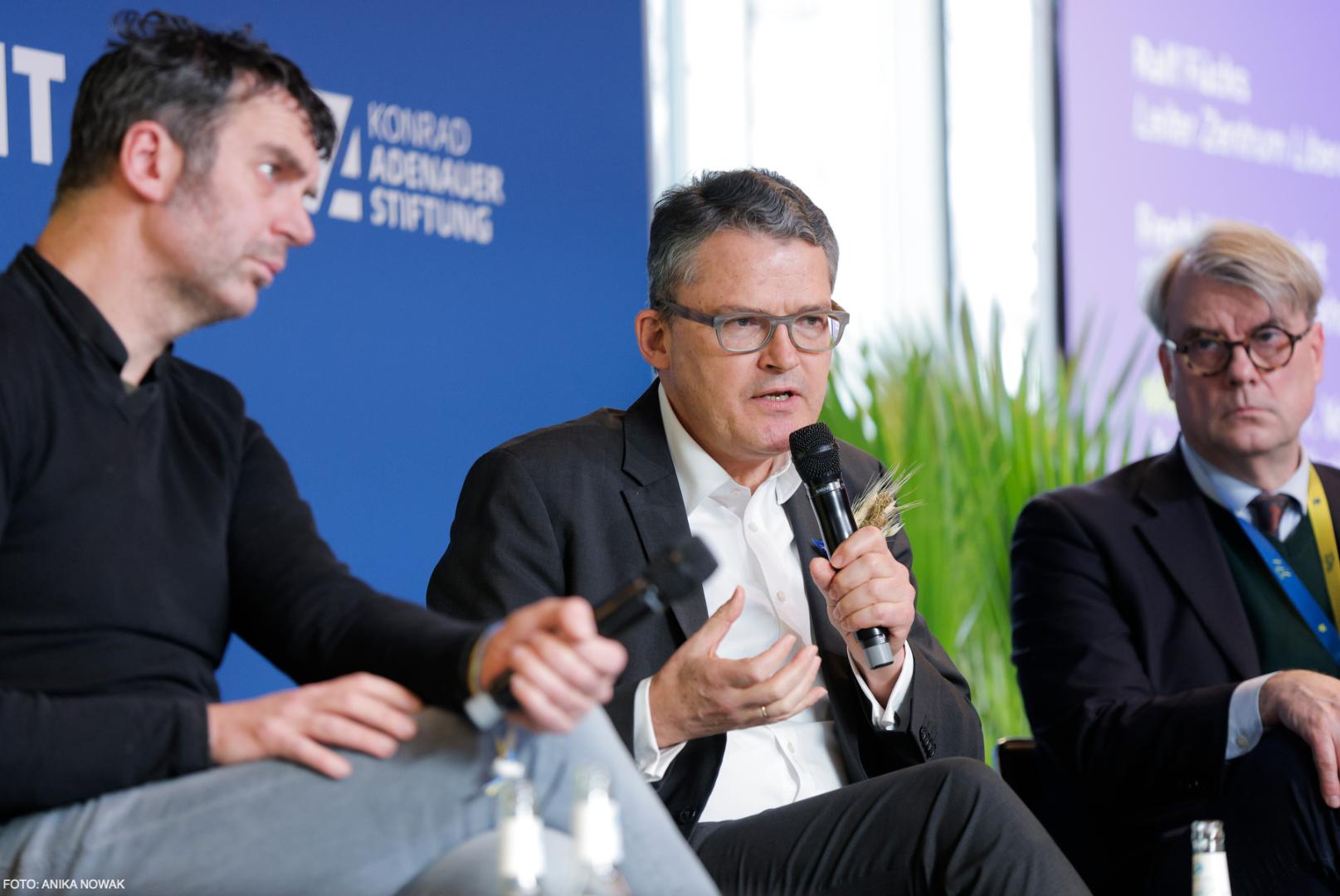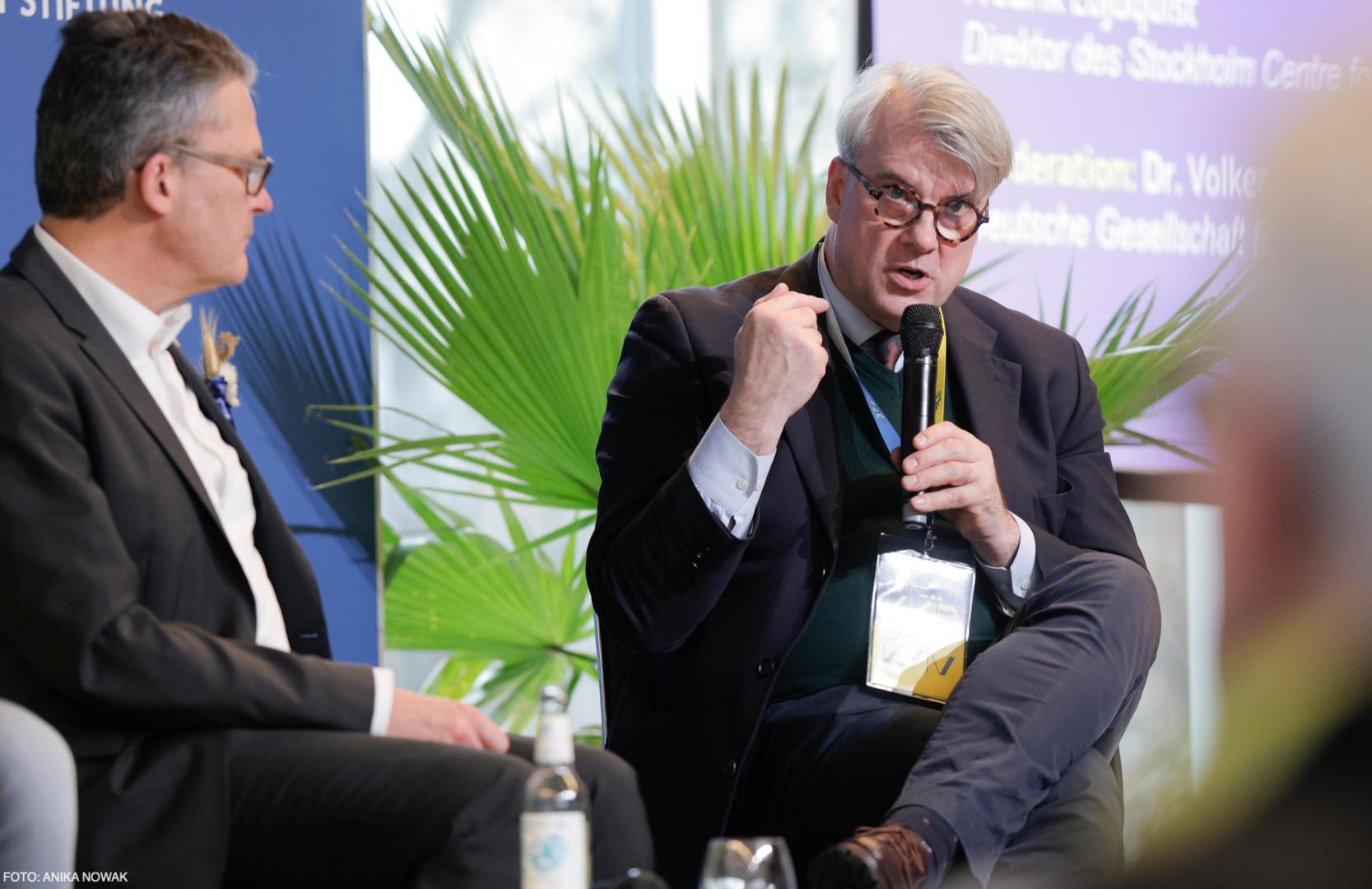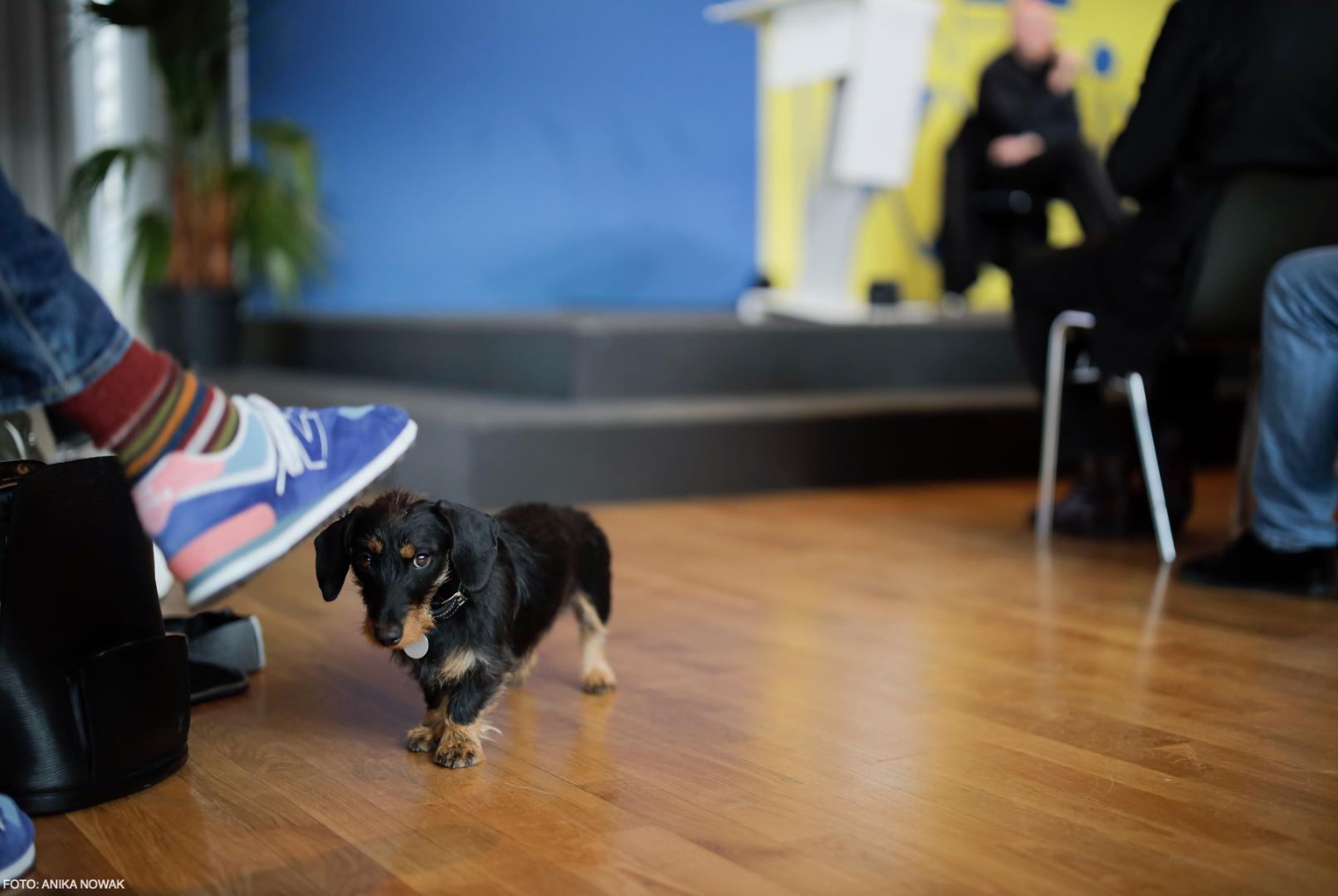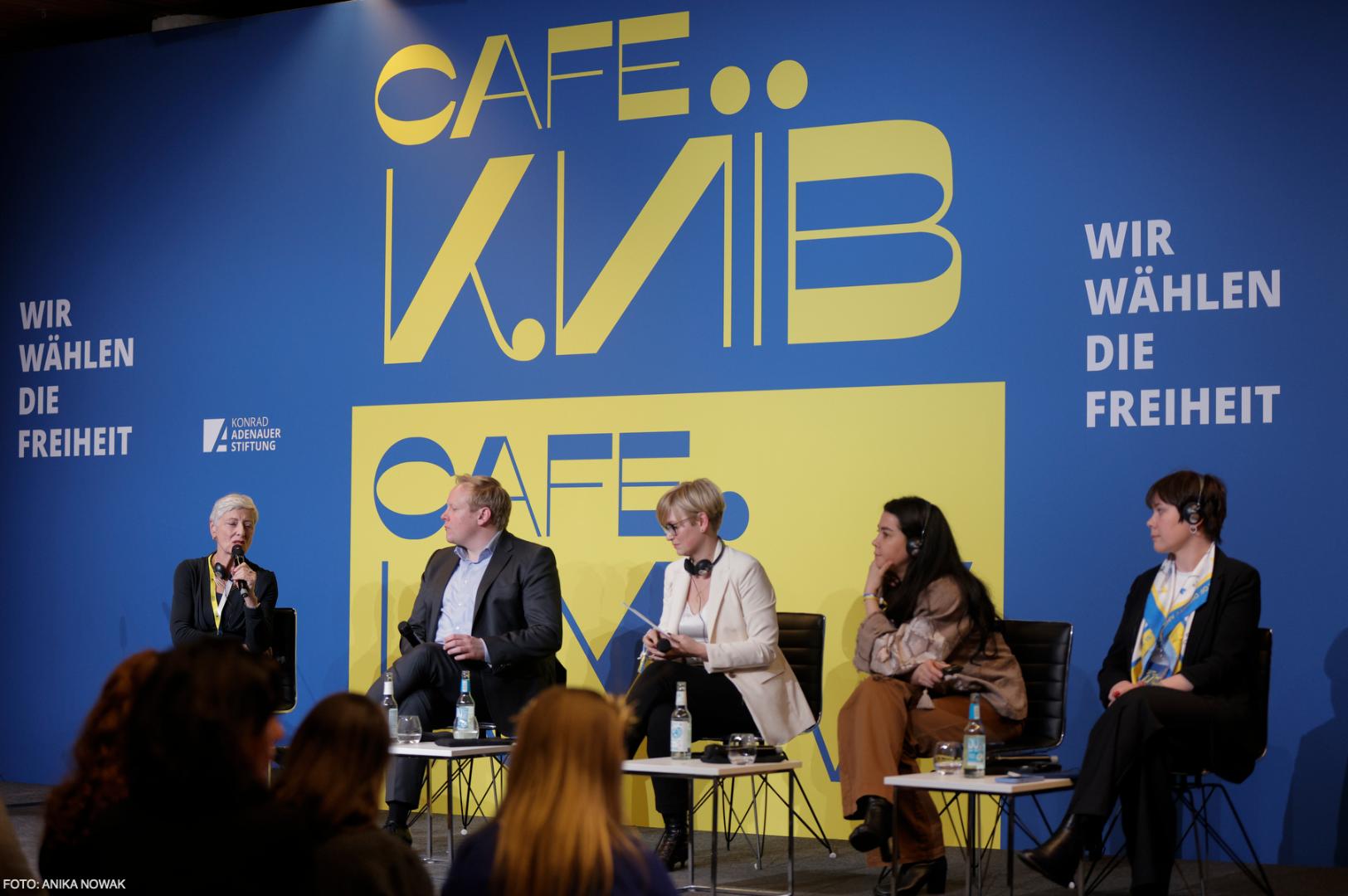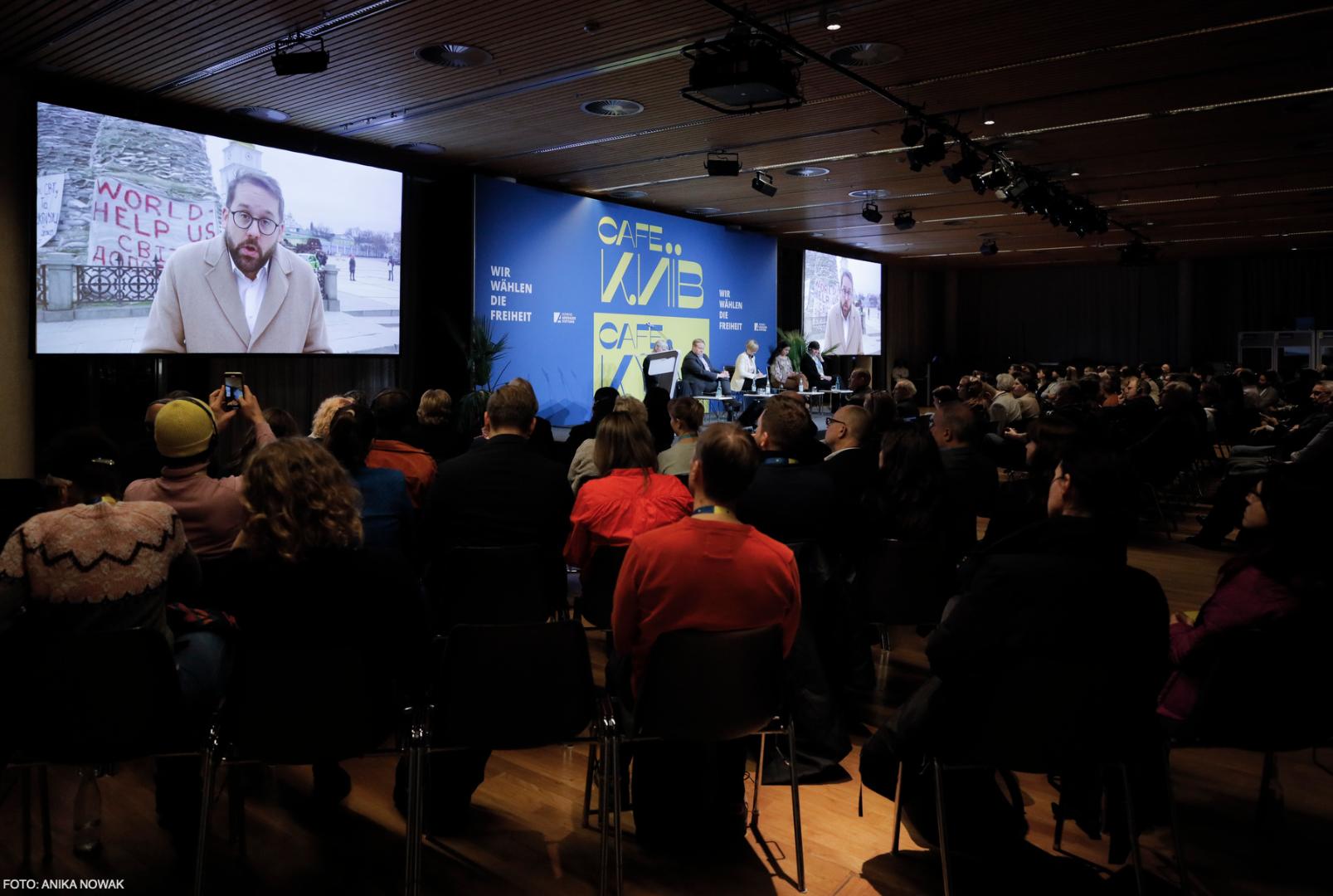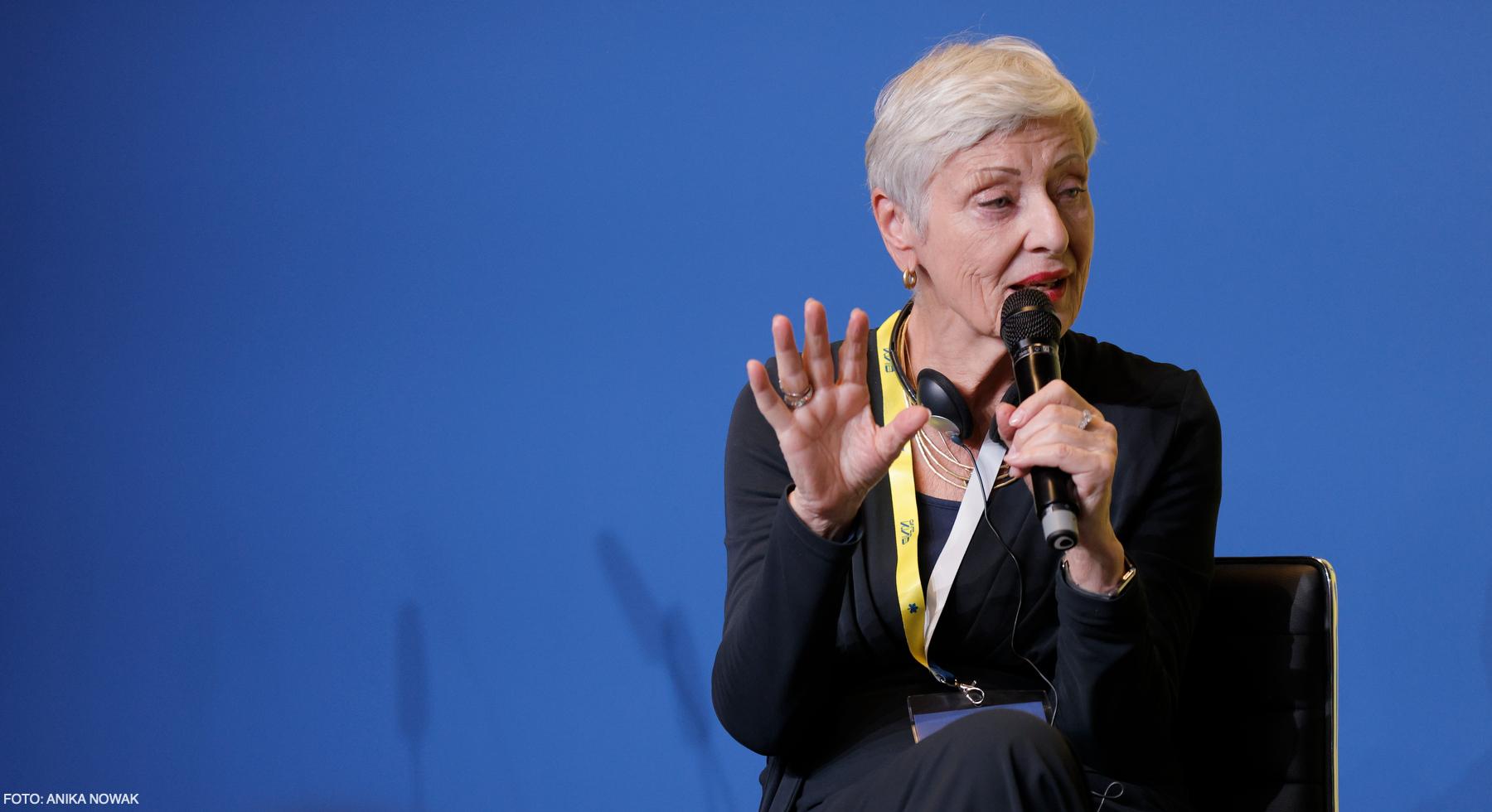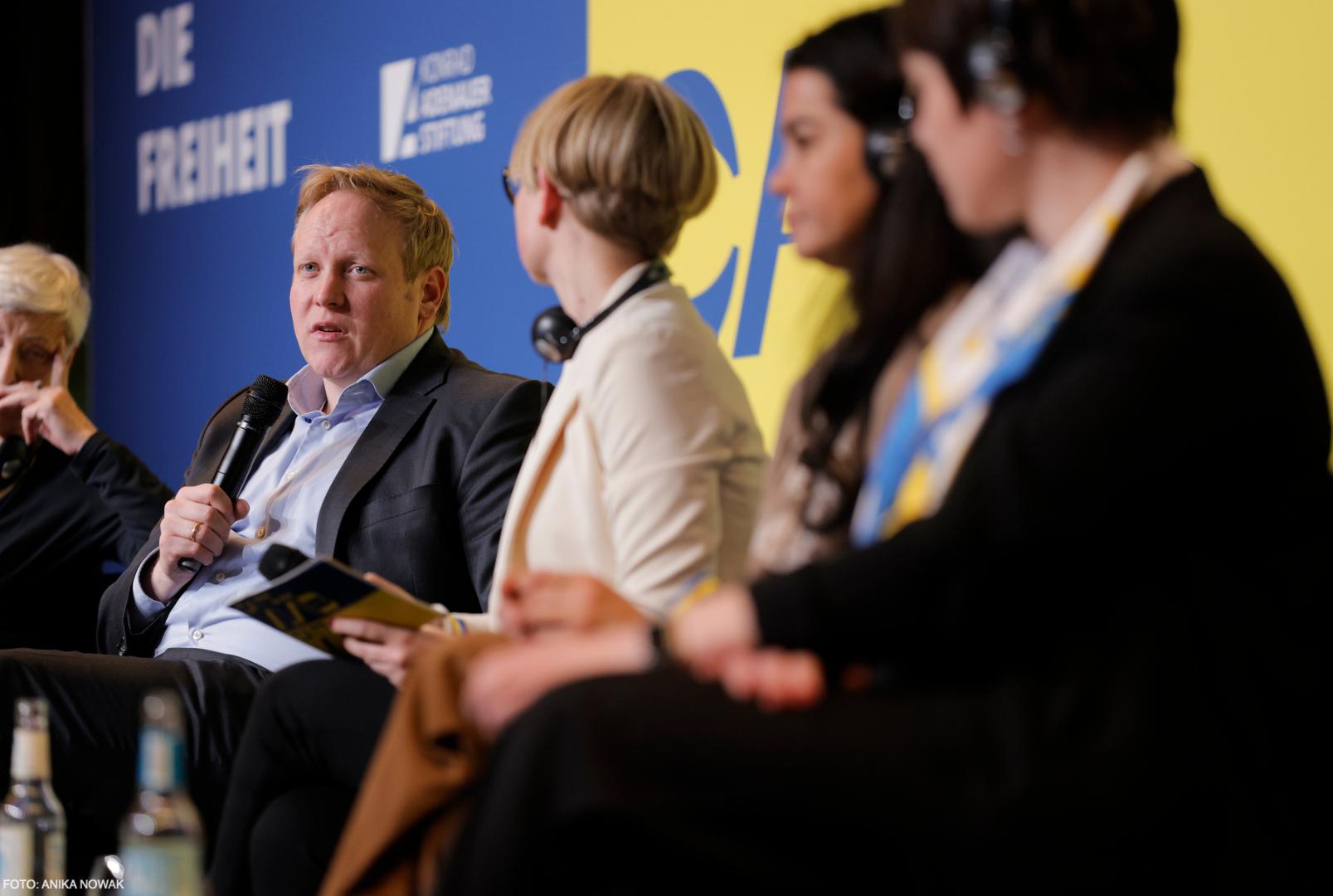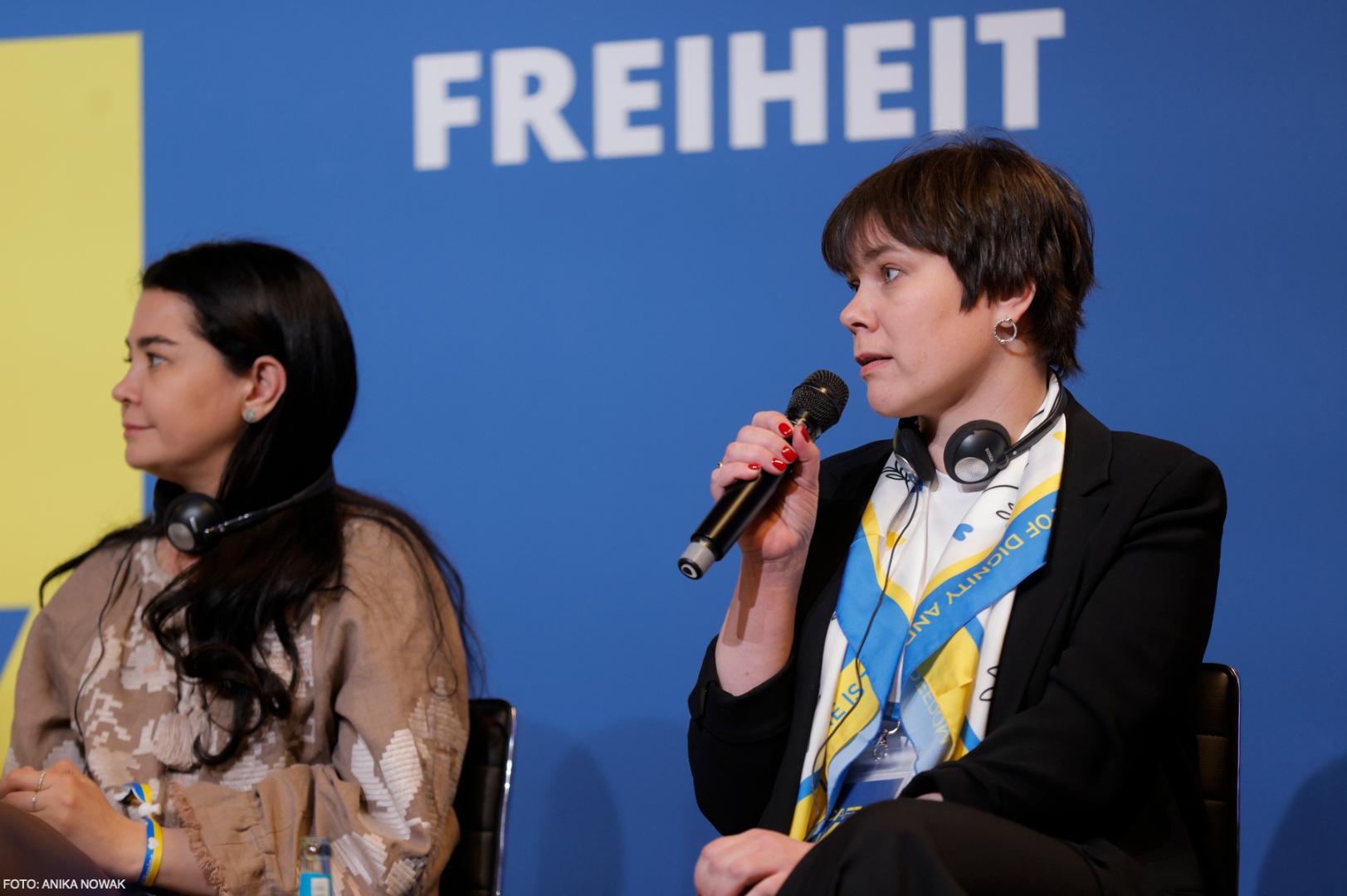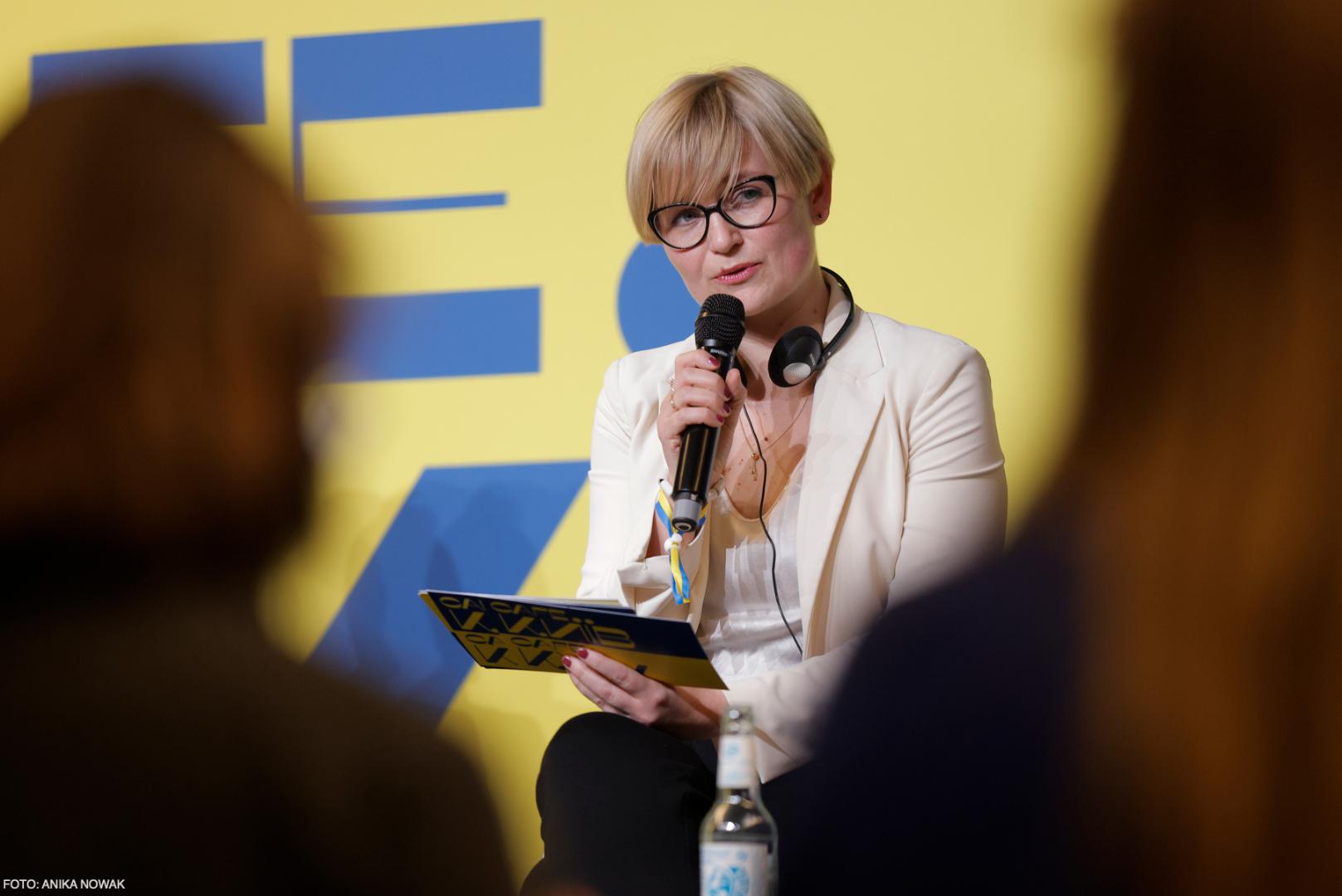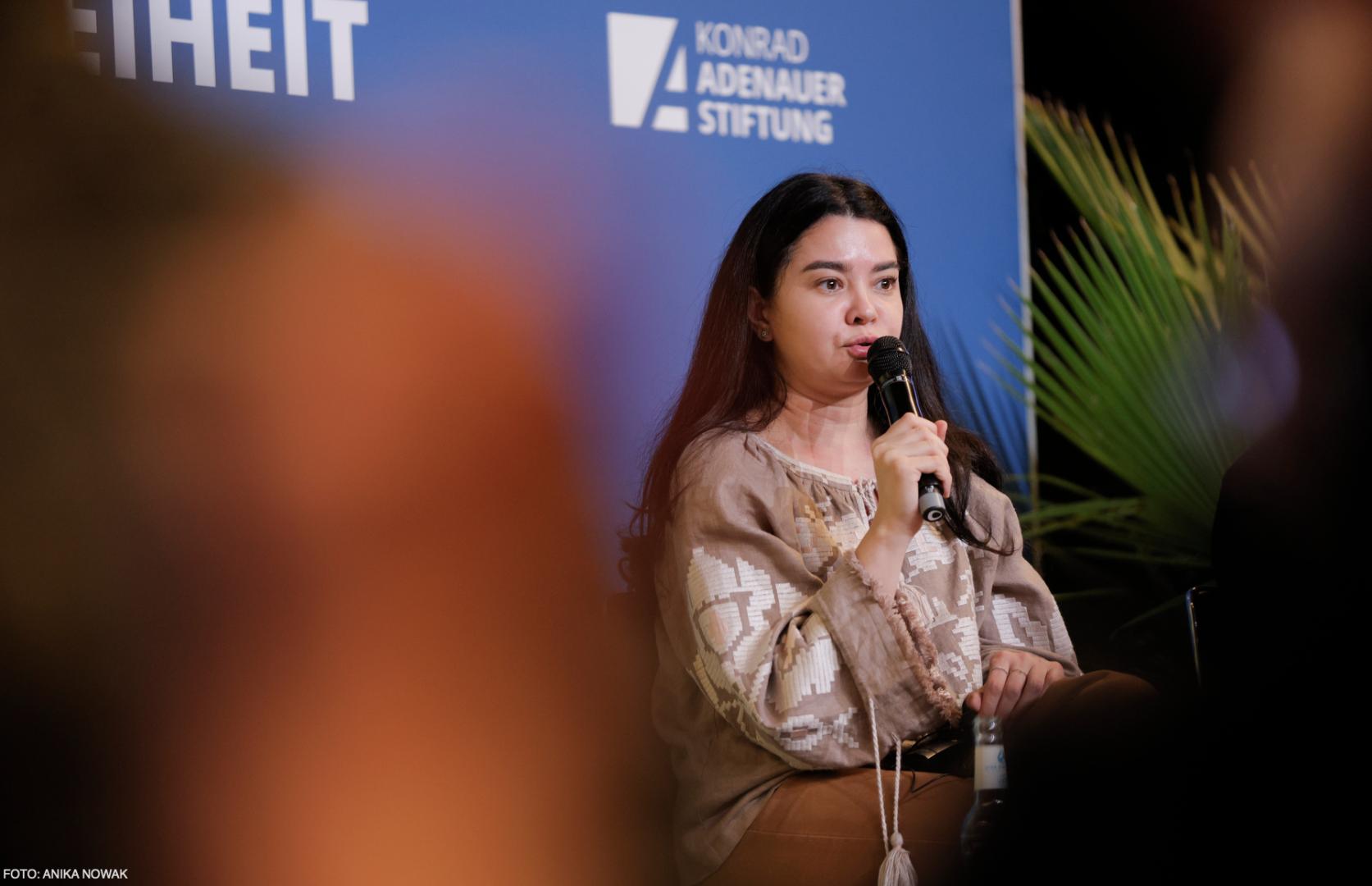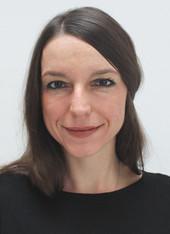"Those who declare neutrality in the face of violence support the aggressor. That may not be the intention, but that is the effect!" - with these words Prof. Dr. Norbert Lammert opens our Cafe Kyiv. Throughout the day there will be workshops, discussions, talks, salons and culture. The focus is: We do not talk about Ukrainians, but with them.
Art action "Cafe Kyiv"
"Unfortunately, Ukraine is not under monument protection. Not the places and, unfortunately, not the people." that is why we, as a foundation, advocate that the authorities rename Cafe Moscow, at least for the duration of Russia's ongoing acts of war in Ukraine. The Ukrainian ambassador in Berlin, Oleksii Makeiev underlined this demand. Currently we could achieve that within the framework of an art action the cafe was renamed for some days in "Cafe Kyiv". The Ukrainian ambassador welcomed the audience: "I am glad that today hearts beat in a blue-yellow beat", Makeiev said. "Lasting peace does not fall from the sky, but must be fought for. And freedom is the core of this peace", he stressed. Makeiev thanked the German people for welcoming his compatriots. This, he said, shows that Germany and Ukraine have grown closer and have entered into a family relationship.
Freedom to be secure: Why Ukraine must win the war
In our panel "Freedom to be secure: Why Ukraine must win the war," Dr. Marie-Agnes Strack-Zimmermann, Ivana Klympush-Tsintsadze, Ratislav Kácer and Sönke Neitzel discussed the issue under the moderation of Sabine Adler.
Rastislav Káčer, Minister of Foreign and European Affairs of Slovakia, called for action. "If we do not act now, all the historic treaties we have won in Europe will be overturned". Therefore, even a new territorial reality would not be acceptable. He backed Ukraine and awarded it sovereignty. "Peace will come when Ukraine wins and has its territory back", Káčer said. The Slovak minister stressed that Germany was a reliable partner and was also getting involved by supplying weapons.
Sönke Neitzel, Professor of Military History / Cultural History of Violence at the University of Potsdam, also spoke in favor of further arms deliveries to Ukraine. Mere peace negotiations are not enough, as history shows, he said. "Wars are decided on the battlefield. Peace treaties such as the Treaty of Versailles are unfortunately only an ade on", Neitzel explained.
Urgency of military support
Much military equipment has already been delivered to Ukraine, he said, but Marie Agnes Strack-Zimmermann, chairwoman of the Defense Committee in the Bundestag, regretted that industrial production times for military equipment take too long. "If Russia has taken place, then the Baltic states will be in danger and then the NATO area will be affected", she warned. She rejected premature NATO membership for Ukraine, saying that certain admission rules would have to be respected. But for her it is clear that in the future Ukraine must become a member. She advocated defending Europe's values and condemning illegal territorial encroachments. After all, she said, it is necessary to protect future generations. "Ukraine also belongs to a free Europe", Strack-Zimmermann said.
Peace negotiations recede into the distant future
The view of possible peace negotiations on the part of the Ukrainians is currently sobering. "We see that a country is attacking us and wants to wipe us out", said Ivanna Klympush-Tsintsadze, a Rada deputy and former deputy prime minister of Ukraine. On the part of the aggressor, the deputy sees no readiness for negotiations. "All dictatorships in the world will receive a positive message if we give up", she warned strongly. If Ukraine loses, it would have drastic consequences for the globe and for prosperity, she said. "We have stopped being afraid", she said on the first panel, appearing invigorated. "We need to win so that we can get back to our fundamental values".
Freedom to be sustainable: Economic development and recovery
The second panel addressed the economic development and reconstruction of Ukraine. The President of the Kyiv School of Economics, Tymofiy Mylovanov, opened with a video statement in which he presented key facts about the current situation: the Ukrainian economy shrank by more than 30% in 2022, no economic growth, inflation is 25% and 30% of Ukrainian land is contaminated by mines. Thomas Kleine-Brockhoff, Vice Chairman of the Transatlantic Task Force of the German Marshall Fund, emphasizes, "For Ukraine to succeed, it needs security and economic recovery. Post-war planning must begin now"!
Multi-Donor Coordination Platform: financial Ramstein.
High hopes are pinned on the multi-donor coordination platform created by the G7 countries, the so-called "financial Ramstein." Maria Repko, deputy director of the Center for Economic Strategy, argues for a clear agenda that should include the organization of emergency humanitarian aid, infrastructure assistance, economic development, reconstruction assistance and humanitarian demining.
German companies in Ukraine
Reiner Perau, managing director of the German-Ukrainian Chamber of Industry and Commerce, highlights the problems German companies face in Ukraine, such as higher production costs, labor shortages (men go to war), bureaucracy and lack of transportation capacity.
International investors sought
A key topic of discussion was also the issue of investment. Kleine-Brockhoff made it clear, "The idea of unconditional financial support is not sustainable and probably won't continue that way in the future". Mobilizing private capital will be key to attracting investors, he said, but investment insurance and guarantees are needed.
Threat of brain drain
All panelists agreed that rebuilding efforts will be critical to avoid the risk of brain drain. Kleine-Brockhoff already provided a concrete proposal and advocated incentive systems for returnees.
Freedom to be democratic - Kyiv instead of Moscow - Prospects for a new German and European Ostpolitik
On the third large panel, the four discussants Roderich Kiesewetter MdB, Tomáš Kafka, Ambassador of the Czech Republic, Ralf Fücks, Director of the Center for Liberal Modernity and Fredrik Löjdquist, Director of the Stockholm Centre for Eastern European Studies, moderated by Dr. Volker Weichsel, Deutsche Gesellschaft für Osteuropakunde, agreed that a new Ostpolitik was needed. This means that there is a need for a separate Russia policy and a new Ostpolitik that is no longer shaped by looking to Russia. This also means critically reflecting on decisions made in the past.
New narratives needed in Germany
Roderich Kiesewetter MdB emphasizes that this war is not simply between Russia and Ukraine: "We have to understand: We are a target of war!" Therefore, he says, the goal must be for Ukraine to win the war of aggression. "Russia must learn to lose", he also emphasizes in the discussion. Furthermore, the EU and NATO must make demands; for example, to withdraw nuclear weapons from Kaliningrad, as well as the withdrawal of Russian troops from Transnistria and Georgia.
More courage in political support for Ukraine
Ralf Fücks summarizes how far Ukraine will get depends on the fighting morale of the population and how many resources the West puts into the balance. However, he sums up German support as "Too little, too late!" It is not enough, he says, for Russia to withdraw. For that, he said, more courage is needed in supporting Ukraine, because the Kremlin has not backed down from its demands since the war of aggression began.
Ukraine is colorful and strong
In addition to opinionated discussions on various panels, workshops and artistic encounters also took place. In the film "THE TWENTY-FOURTH" five Sur Place fellows shared their memories of February 24, 2022, and put it up for discussion. But the event's participants were also taken into the world of museum art in 3D via VR glasses or, elsewhere, into ruined urban canyons. Craft enthusiasts were able to weave traditional flower hair wreaths or browse the various booths for jewelry and clothing. The various food stalls took participants on a culinary journey through the different regions of Ukraine. Not only did people flee from these many areas, but many pets fled with them. Therefore, some four-legged friends were in the hallway or in the event rooms and were very welcome at the event.
Freedom to be free - We choose freedom
"The people in Ukraine, the people here in Kyiv are particularly aware these days of what is happening in Germany. Who is taking to the streets and what is being taken to the streets for."
Panel four starts with a video message from Paul Ronzheimer, Deputy Editor-in-Chief of BILD, who is currently back in Ukraine. He emphasizes that on the ground, some international journalists have already left - attention to Ukraine is waning.
More than eight million people from Ukraine are now living in European countries as refugees, reports Sevgil Musayeva, editor-in-chief of Ukrayinska Pravda, one of the most influential Ukrainian online newspapers. She, too, emphasizes Ukrainians' fear of losing human capital (brain drain).
"Art also exists in the shelters and in the subway"
Galyna Grygorenko, Deputy Minister of Culture in Ukraine, illustrated the restriction of cultural freedoms on the ground. For example, in the occupied territories, streets are immediately renamed, monuments are dismantled, Ukrainian books are removed, and school programs are changed. Still 80% of artists are on the ground, many of them are currently on the front lines, he said.
"Alice Schwarzer raises her voice for a country that tramples on rights for women"
Marieluise Beck, Senior Fellow at the Center for Liberal Modernity, clearly expressed her lack of understanding of the demand for compromise that is becoming louder in Germany. The debate ignores the fact that it is not "only" about compromises for territories, but concretely about people living in these territories who are confronted with the most serious war crimes. He also blamed the public media for giving a stage to the wrong people.
"We are not living the turn of the times the way we should be living it"
Tillmann Kuban, member of the Bundestag and commissioner for Ukraine's EU accession in the CDU/CSU parliamentary group believes, "There is not enough appreciation in Germany for what Ukrainians are doing on the ground". At the same time, he issued a call to all: "Each and every one of us is challenged to be a multiplier!"
Celebrating for freedom
After intensive workshop work and panel discussions, the evening ended with musical accompaniment from two bands. On the first floor, Ukrainian musician Tankataka, who lives in Germany, sang self-composed songs in chamber pop style. One floor up, musicians together presented the requiem "Lullaby for Mariupol", in memory of all the victims of Russian aggression. Solidarity with Ukraine was celebrated at the bar with cocktails that were strong like "Selensky" or kept awake until the "Kyiv Sunrise".
3,000 visitors on the day showed their solidarity with Ukraine and agreed: we choose freedom. And to freedom also counts dancing.
Topics
Cafe Kyiv 2025: ‘We stand by the side of Ukraine’
Break-up of the traffic light coalition without consequences for political opinions
Showdown in the Oval Office
Election analysis of the parliamentary elections in Hamburg on 2 March 2025
Bundestag election 2025: France hopes for policy change in Germany



